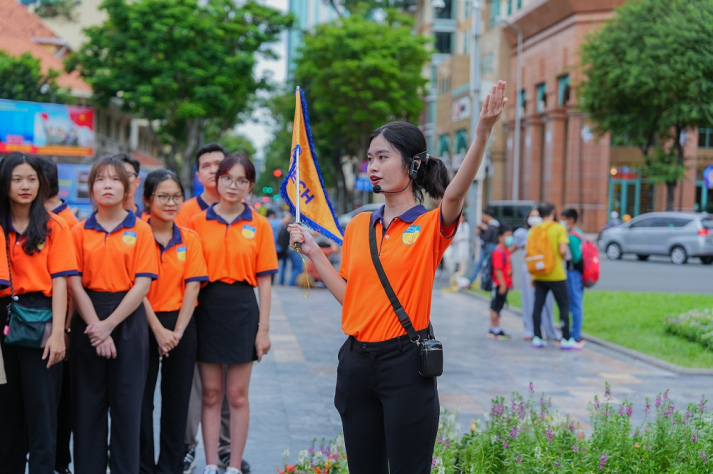
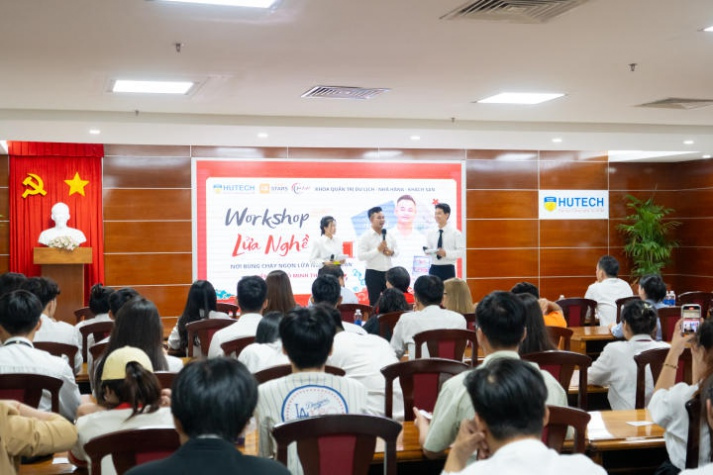
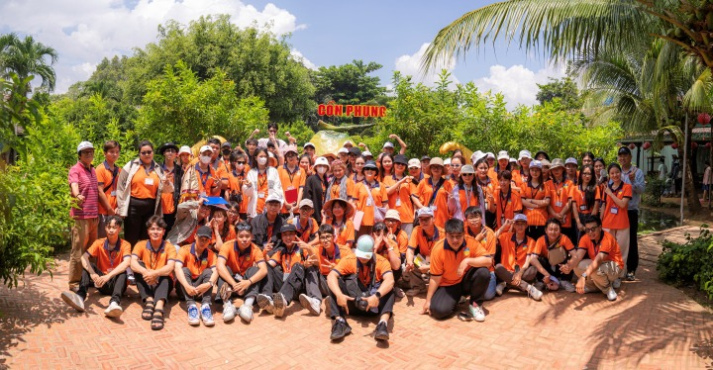
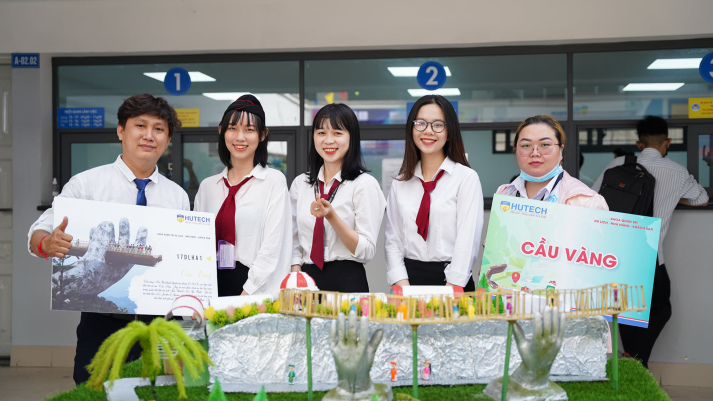
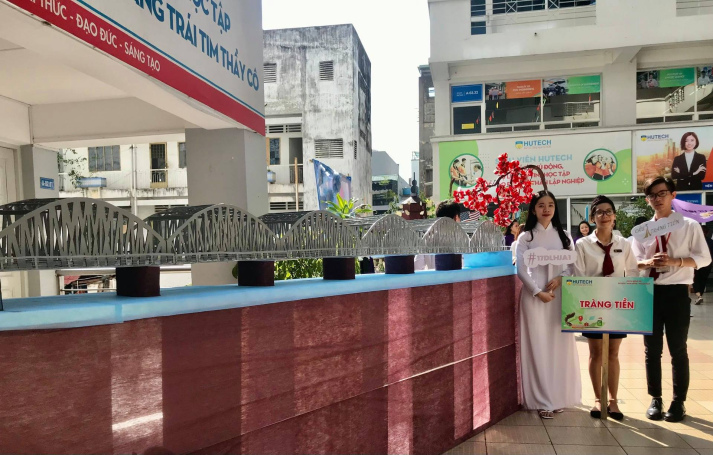
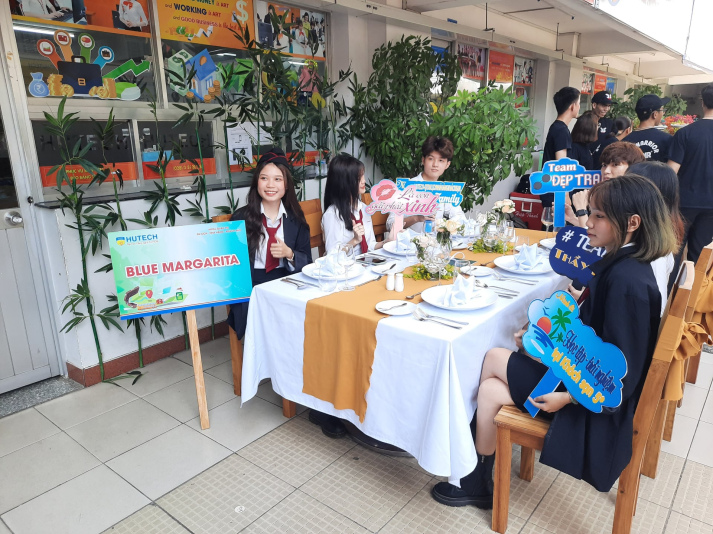
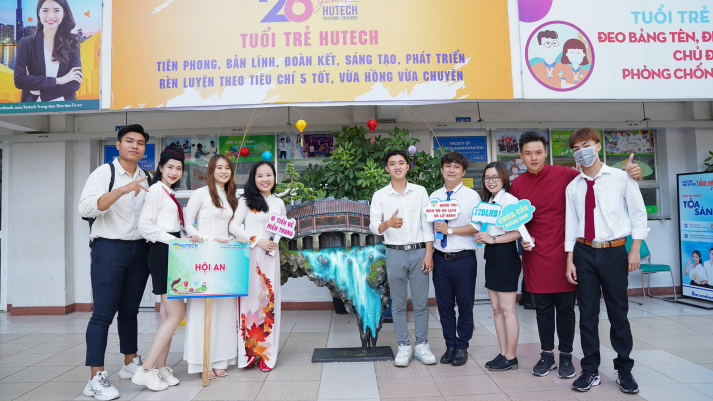
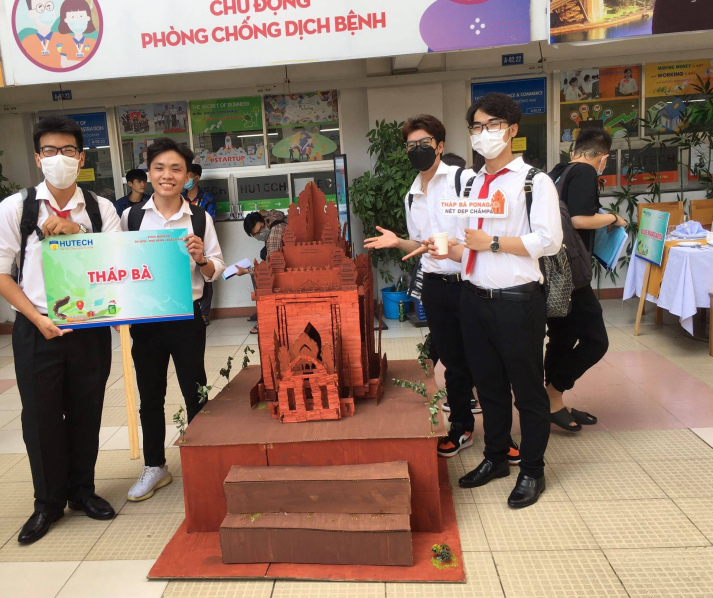
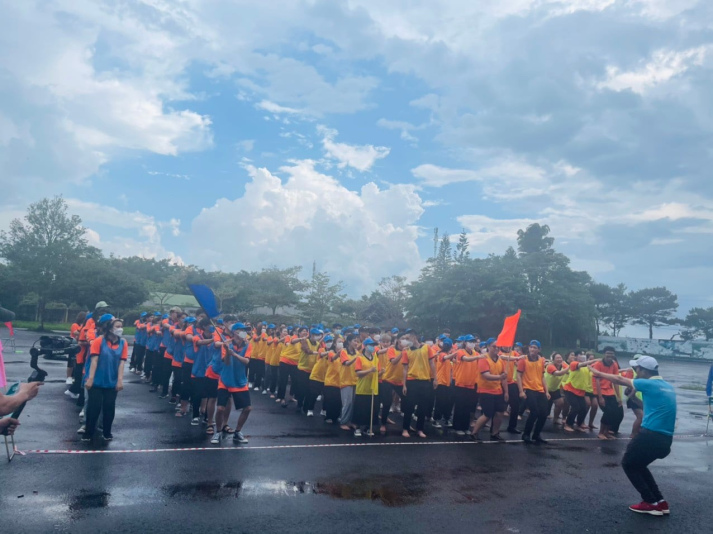
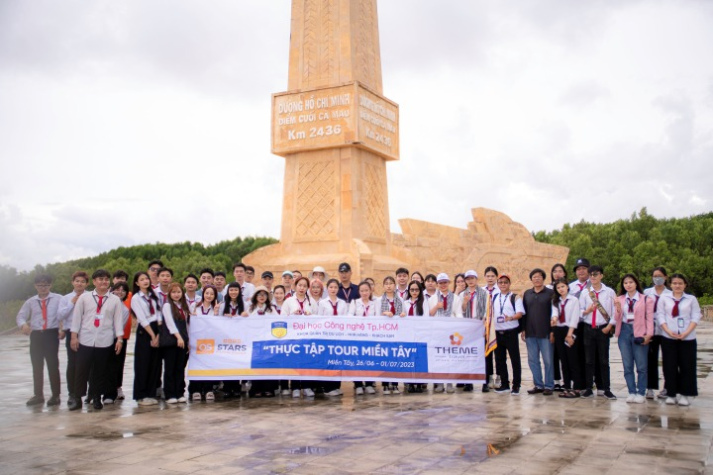
I. INTRODUCTION
1. OVERVIEW
1.1. About FTHM - Aspiration for excellence – Innovation and growth
The predecessor of the FTHM is the Tourism Department under the Faculty of Business Administration. Due to significant development in all aspects, the Tourism Department was separated to form an independent Faculty with the main function and mission of providing undergraduate and postgraduate programmes. Since the establishment of the FTHM in 2005, the Faculty has trained in three programmes: Tourism and Travel Management, Restaurant and Catering Management, and Hospitality Management. Graduates of the Faculty of Tourism and Hospitality Management receive Master's and Bachelor's degrees according to the regulations of the Ministry of Education and Training. In 2022, the Faculty opened an Event Management programme to create more opportunities for students. Throughout the practical implementation of the training mission, the faculty and teaching staff of the Faculty have continuously grown in both quantity and quality.
The Faculty has a team of permanent and guest lecturers who are professors, associate professors, and doctors with expertise, practical experience, and high reputation from research institutes, universities both domestically and internationally, especially from leading companies in the fields of Tourism - Restaurant - Hospitality Management in Ho Chi Minh City and nationwide who are directly involved in teaching, guiding, and scientific research. This can be considered a crucial factor in enhancing the effectiveness, quality of education, and scientific research of the Faculty. Furthermore, during the formation and development process, the Faculty has always identified its core values as Knowledge - Skills - Integration to align with HUTECH's principles: Knowledge - Ethics - Creativity.
The curriculum of the FTHM is built on five main academic blocks: foreign languages, social knowledge, personal development, specialized training, and professional internships, ensuring good adaptation to various jobs in multidisciplinary, multicultural environments after graduation. In addition to the core programmes, students participate in academic clubs such as Hu-Hospi Club, Showmanship Club, Research Club, we are one Club, Creative Club, school's Union activities, cultural activities, sports, professional competitions to enhance comprehensive vocational skills, stimulate ideas, promote creativity, and lay the foundation for future entrepreneurial projects.
Students studying at the FTHM are educated in a dynamic, modern environment with high quality facilities, alongside dedicated, knowledgeable, and experienced academic staff. Apart from luxurious classrooms equipped with teaching aids and research support equipment, the Faculty has invested in practical centers: Restaurant practice center, Hotel simulation center, Kitchen practice area, Bartender counter, ensuring the best practical conditions to maximize students' professional skills; Free Internet access on campus; Diverse library system with physical and electronic books serving educational and research needs. With an interactive educational environment that combines research, students are encouraged to maximize their creativity, understanding, and skills throughout their training to achieve success after graduating from the University.
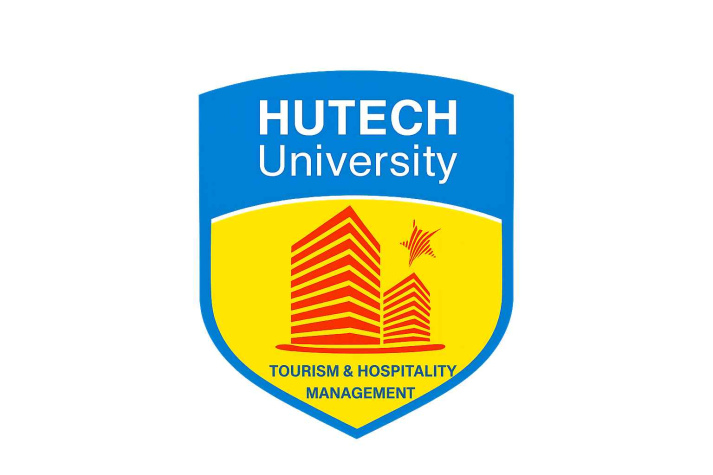
CONTACT
A-02.21 - 475A Dien Bien Phu, Ward 25, Binh Thanh District, HCMC
Phone: 028 7106 8863 - 028 6686 9198
Email: [email protected]
Website: Faculty of Tourism and Hospitality Management | Khoa Quản trị Du lịch - Nhà hàng - Khách sạn
1.2. Vision
Developing the FTHM to become the key department in training and conducting in-depth research in the field of Tourism and Hospitality Management.
1.3. Mission
The faculty always inherits and promotes the good traditions that HUTECH has achieved in the past period. It can be said that the FTHM is one of the leading units nationwide in innovating teaching methods and enhancing the quality of education. It is always a place where other universities learn from experiences in the model of enterprise-based semesters, organizing extracurricular courses, and collaborating with businesses in the high -class tourism, restaurant, and hotel sectors.
Developing and enhancing the capacity of the leaders – lecturers - staff in terms of quantity and quality, meeting the increasing demands of the market and international integration, contributes to enhancing the brand of HUTECH and the position of the FTHM department within the university.
Developing programmes, improving the quality of curricula, and innovating teaching methods.
Building a creative academic environment to attract students for learning and research activities.
Improving the quality of the training programmes to a high level according to national and regional accreditation standards. Gradually advancing the FTHM to the top group in terms of ranking students' employability.
Rapid, comprehensive, and robust development of human resources, standardizing and enhancing the quality of the leaders – lecturers - staff to meet the requirements for improving the quality of education and management, research, and community service activities, in line with the university's human resource development strategy.
1.4. Core values
Aligned with the principles of Knowledge, Ethics, and Creativity of HUTECH, the core values of the FTHM are defined as: Knowledge - Skills - Integration.
2. LEADERSHIP
The Faculty of Tourism and Hospitality Management at HUTECH currently has one Dean, two Vice Deans, and a team of academic staff responsible for managing the following academic programs: Tourism and Travel Management, Hotel Management, Restaurant and catering Management, and Event Management.
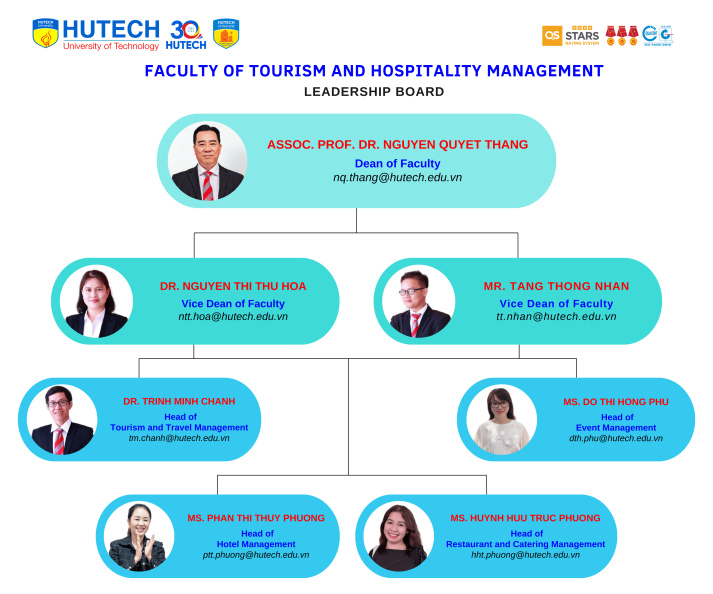
3. ACADEMIC PROGRAMS
|
No |
Academic Program |
Degree Level |
Program code |
|
Postgraduate Level |
|||
|
1 |
Master |
60340103 |
|
|
Undergraduate Level |
|||
|
1 |
Bachelor |
7810103 |
|
|
2 |
Bachelor |
7810201 |
|
|
3 |
Bachelor |
7810202 |
|
|
4 |
Bachelor |
7340412 |
|
II. BACHELOR
1. BACHELOR OF TOURISM AND TRAVEL MANAGEMENT
1.1. Program Goals
The undergraduate program in Tourism and Travel Management trains students to possess strong political and ethical qualities, solid industry knowledge, proficient professional skills, foreign language and computer literacy and good health. It fosters creativity, professional ethics and practical experience in travel agencies, enabling graduates to work independently and collaboratively in international, multi-disciplinary, and multi-cultural environments.
1.2. Program Objectives
1.3. Study Environment
The Bachelor of Tourism and Travel Services Management programme at HUTECH offers students a dynamic and practice-oriented learning environment that fosters professional competence and adaptability in the ever-evolving tourism industry.
1.3.1. Flexible Learning Spaces with Practical Integration
Students study in modern, well-equipped classrooms designed to support interactive teaching, group work, and project-based learning. Although dedicated practice labs are not yet available, the programme emphasizes real-world integration through:










These activities help students build essential skills in tour planning, customer service, communication, and real-time problem-solving from early in the programme.
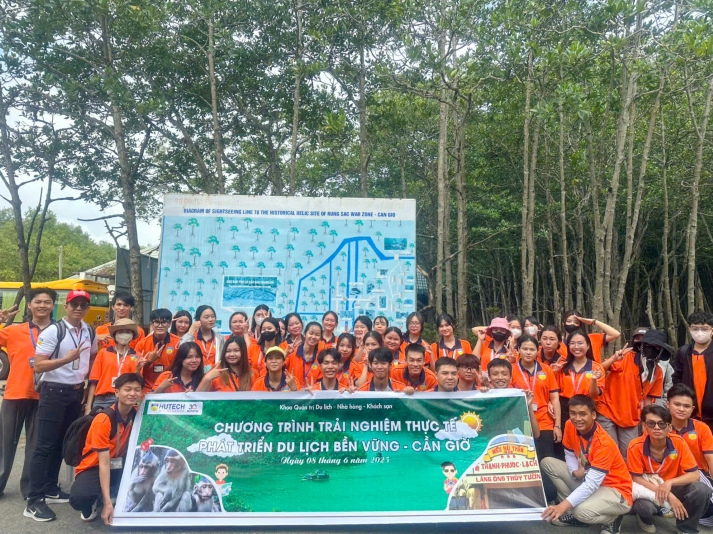
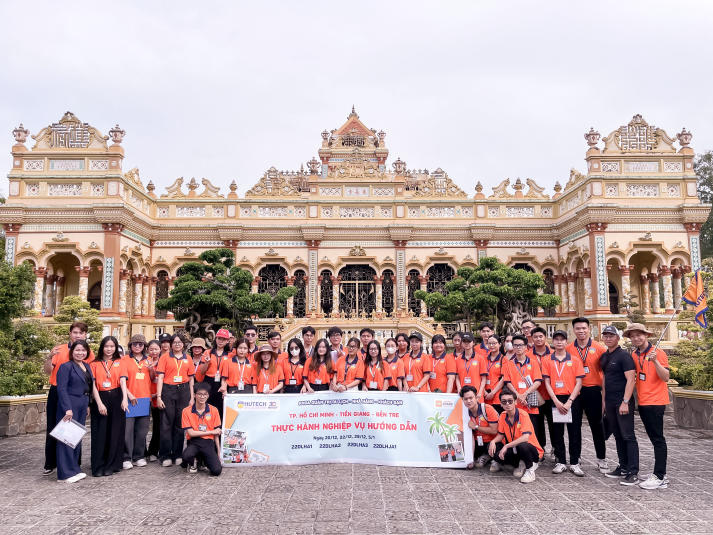
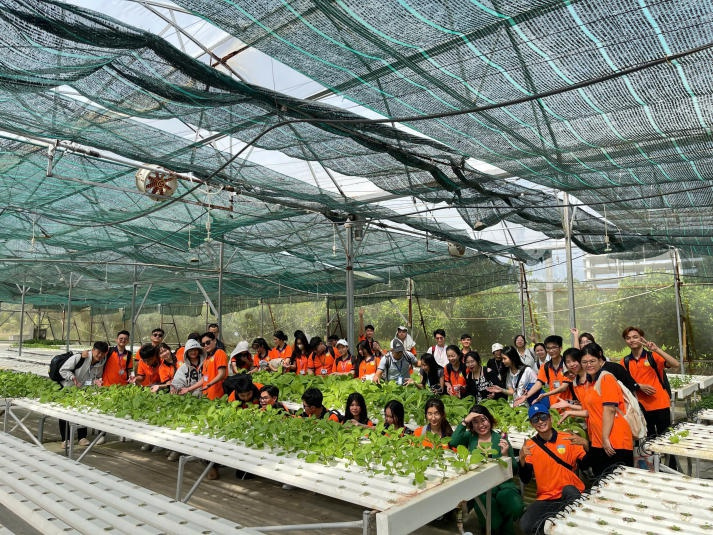
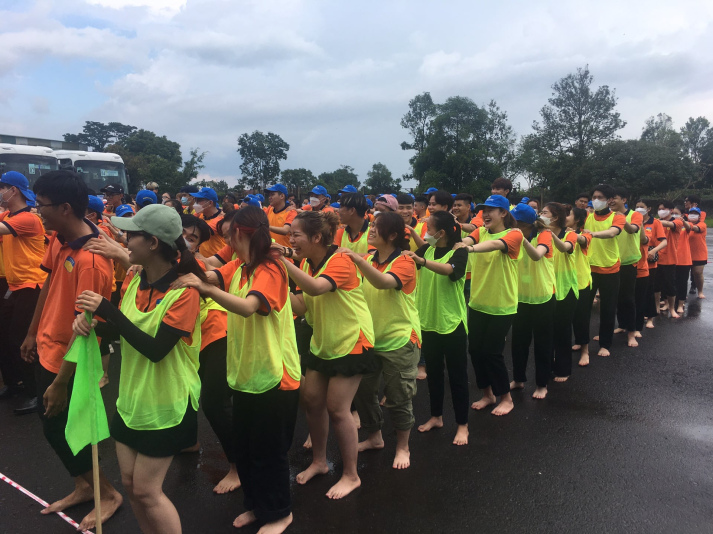
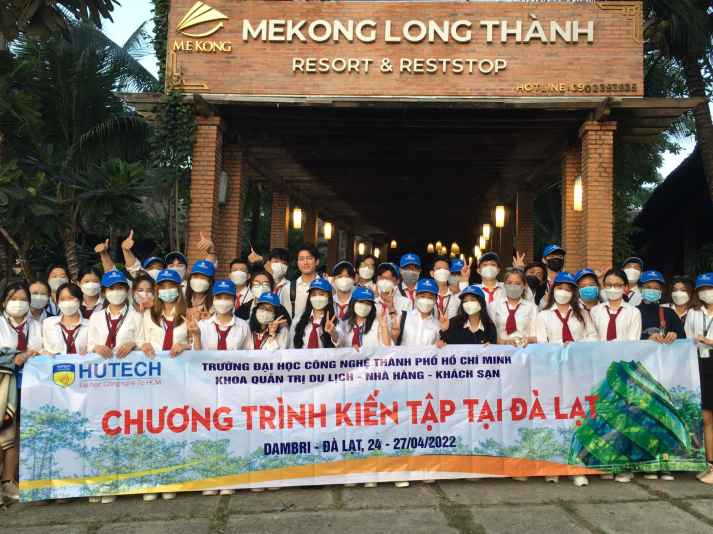
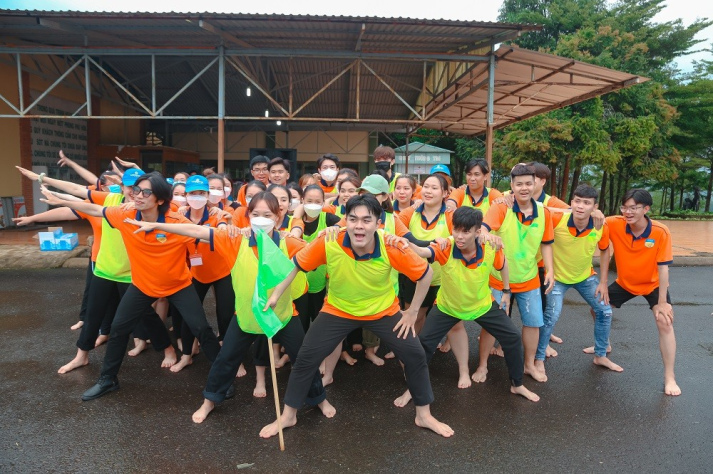
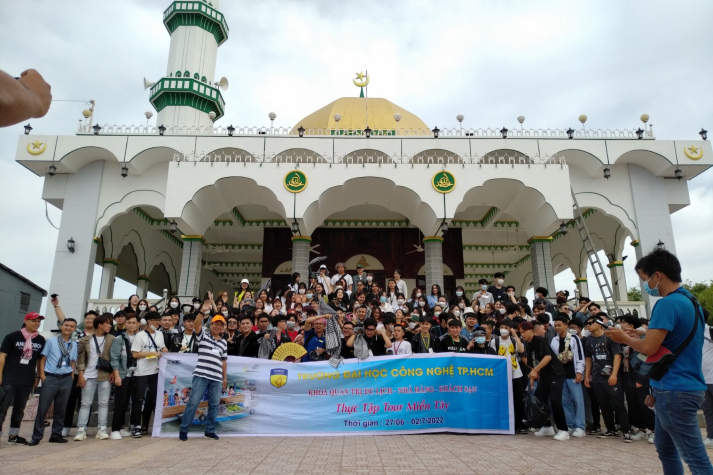
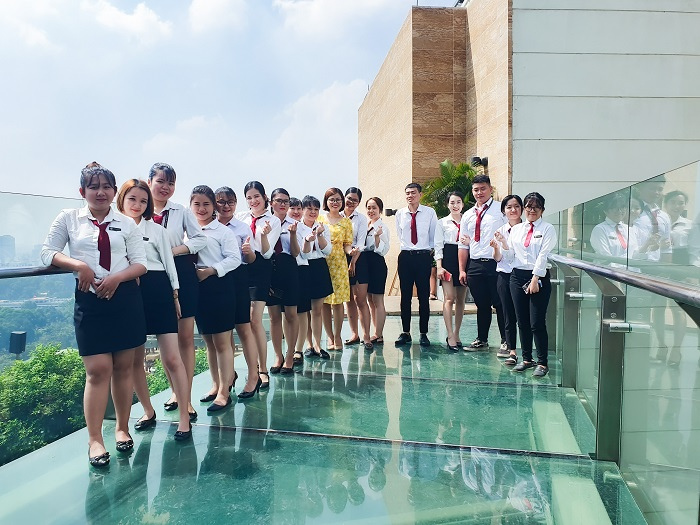
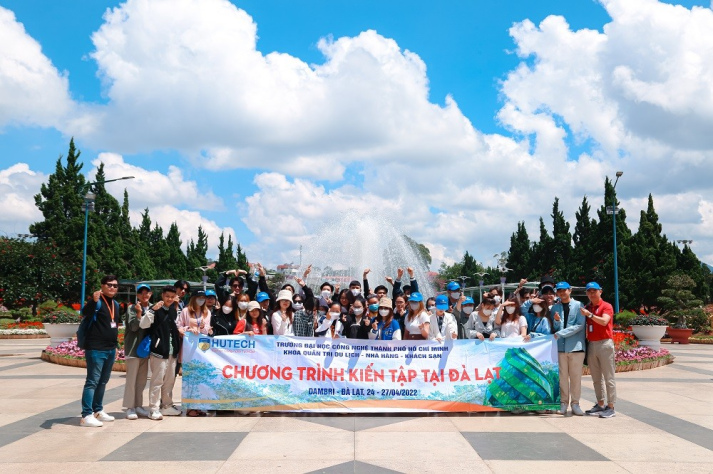
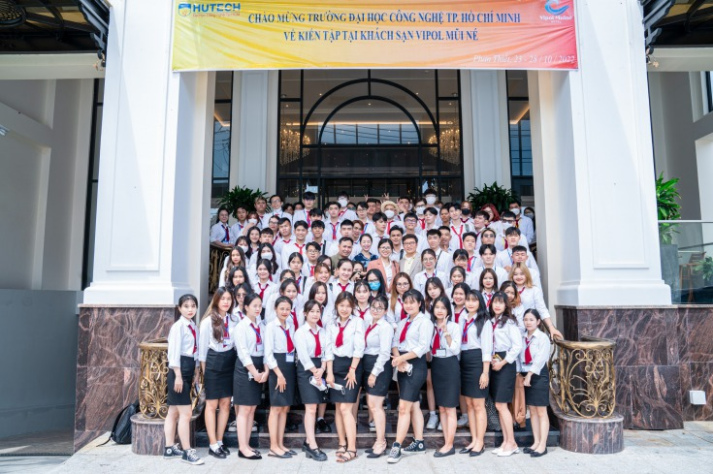
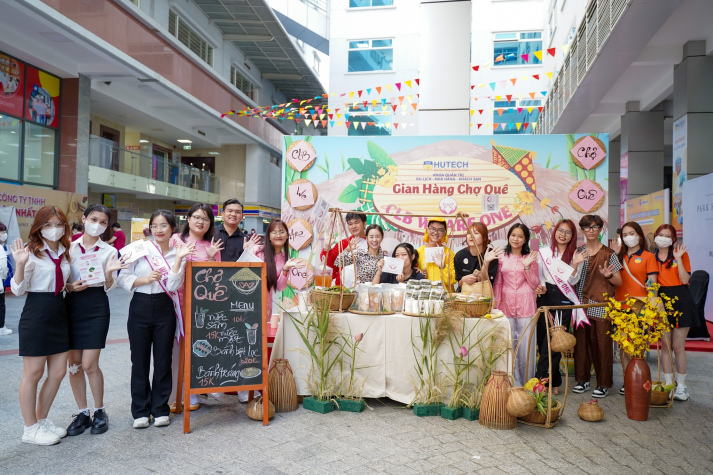
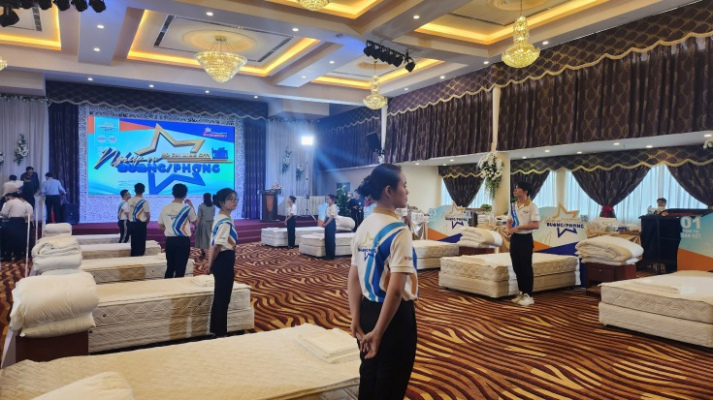
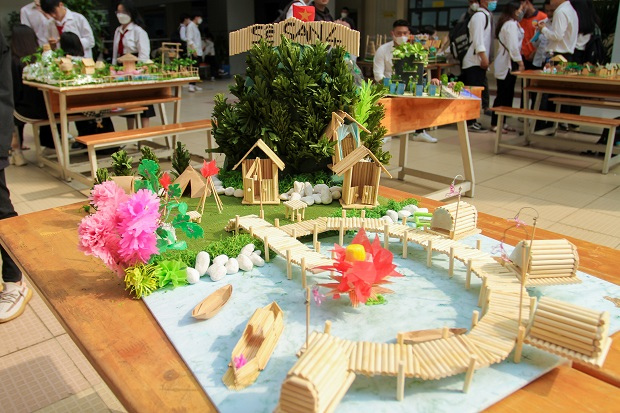
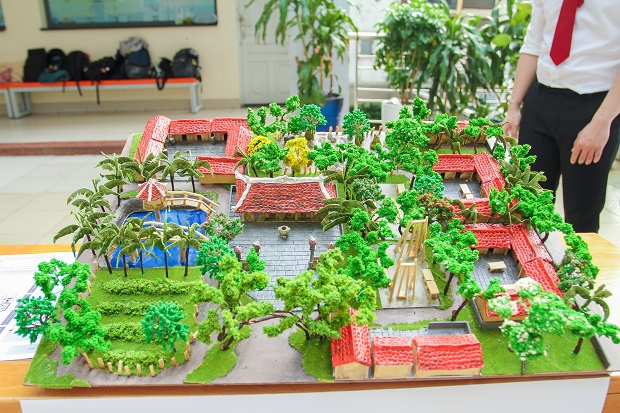
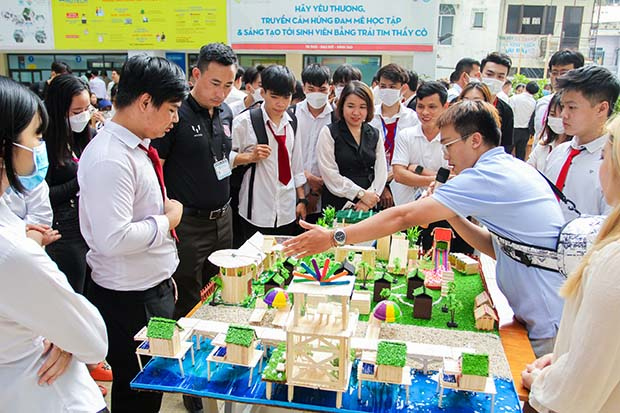
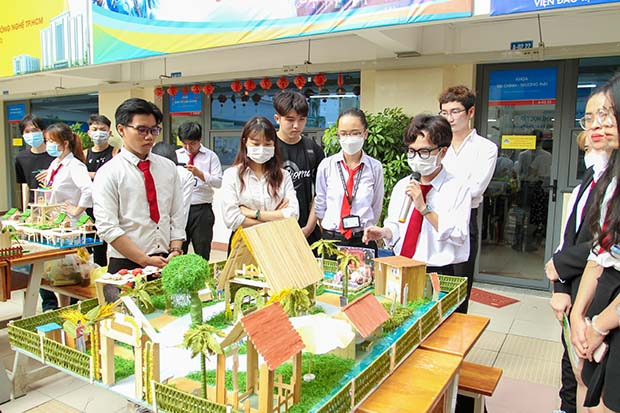
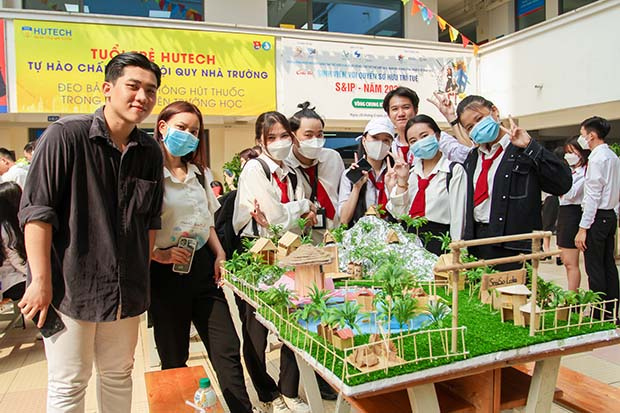
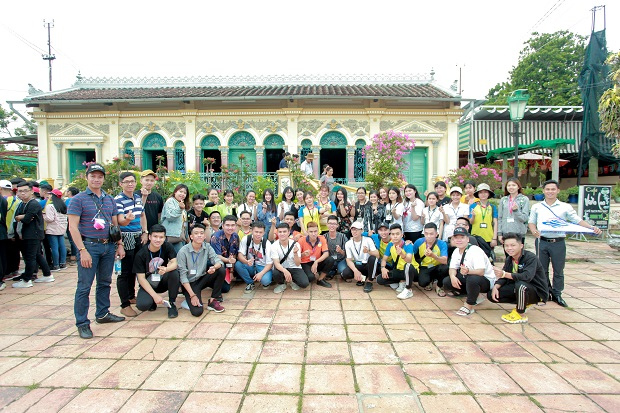
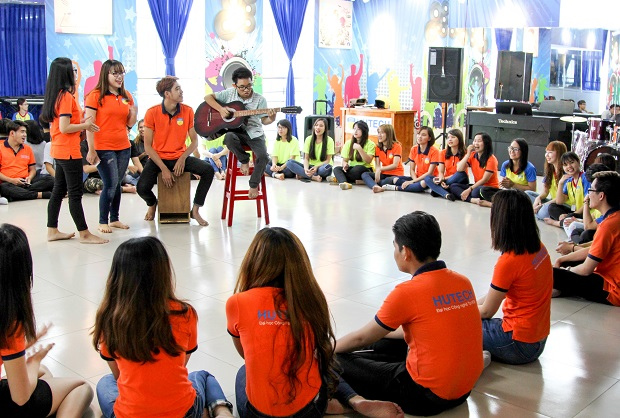
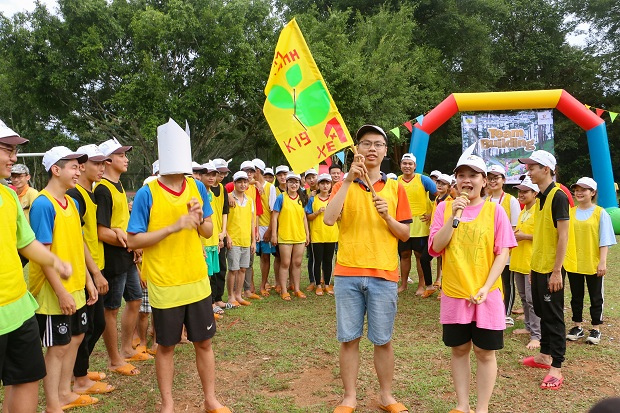
1.4. Program Description
| Name of the Program | Bachelor of Tourism and Travel Management |
| Programme Duration | The program is completed over 3.5 years in a full-time, divided into 11 academic semesters. |
| Total earned Credits | 137 credits |
| Curriculum Structure | Click here for more information |
1.6. Program Learning Outcomes
| Program Learning Outcome (PLO) | Corresponding to the target (PO) | Competency level (*) | |
|---|---|---|---|
| PLO1 | Able to apply knowledge of natural and social sciences, economics, politics, culture, society, law and management to travel business activities, contributing effectively to the sustainable development of society and the community. | PO1, PO3 | 3,0 |
| PLO2 | Able to flexibly apply specialized professional knowledge in tourism business activities to meet the needs of the enterprise and stakeholders, fostering development and integration. | PO1, PO3 | 3,0 |
| PLO3 | Capable of performing specialized tasks in management and operations during the business activities of tourism services. | PO1, PO2 | 5,0 |
| PLO4 | Capable of performing management tasks and entrepreneurial thinking in travel business operations. | PO1, PO2 | 5,0 |
| PLO5 | Able to apply information technology skills, foreign language proficiency, and soft skills in travel business operations. | PO1, PO2 | 4,0 |
| PLO6 | Able to apply information technology skills, foreign language proficiency and soft skills in travel business operations. | PO2, PO3 | 4,0 |
| PLO7 | Demonstrates leadership, enhances team strength and stimulates creativity to achieve work effectiveness. | PO3 | 3,0 |
| PLO8 | Demonstrates self-learning abilities, develops qualities to meet professional demands and maintains a commitment to lifelong learning. | PO3 | 3,0 |
1.7. List of Courses
| Semester | 1st Year | 2nd Year | 3rd Year | 4th Year |
|---|---|---|---|---|
| 1 | ENC101 - English 1 MAN116 - Management TOU107 - Introduction to Tourism NDF108 - National Defense and Security 1 NDF109 - National Defense and Security 2 NDF210 - National Defense and Security 3 NDF211 - National Defense and Security 4 |
ENC103 - English 3 ECO108 - Macroeconomics PSY167 - Applied Psychology TOU108 - Tourist Destinations PSY138 - Psychology and Communication Skills in Tourism SOS115 - Culture of Southeast Asian Countries Elective Knowledge: Group 1: PHT305 -Volleyball 2 Group 2: PHT308 - Basketball 2 Group 3: PHT311 - Fitness and Aesthetics 2 Group 4: PHT314 - Vovinam 2 Group 5: PHT317 - Football 2 |
TOU139 - Sales and Marketing of Tourism Products POS105 - Marxist-Leninist Political Economy TOU135 - Customs and Immigration Procedures SKL115 - Project Design Thinking TOU103 - Tour Guiding Techniques BUS123 - E-commerce in Tourism |
1. POS107 - History of the Communist Party of Vietnam Elective Knowledge: Group 1: Customer Service and Events - MAN131 - Service Quality Management - TOU102 - Customer Service - MAN120 - MICE Tourism - TOU106 - Event Management Group 2: Accommodation Services - MAN117 - Room Management - HMM101 - Diplomatic Reception - HMM104 - Front Office Operations - MAN124 - Restaurant Management Group 3: Graduation Thesis - TOU422 - Graduation Thesis in Tourism and Travel Service Management |
| 2 | 1. ENC102 - English 2 2. SOS101 - Fundamentals of Vietnamese Culture 3. TOU101 - Geography of Tourism 4. TOU719 - Internship in Travel Industry 5. TOU341 - Entertainment Activities 6. ECO107 - Microeconomics Elective Knowledge: - Group 1: PHT304 - Volleyball 1 - Group 2: PHT307 - Basketball 1 - Group 3: PHT310 - Fitness and Aesthetics 1 - Group 4: PHT313 - Vovinam 1 - Group 5: PHT316 - Football 1 |
1. ENC104 - English 4 2. POS103 - Ho Chi Minh Thought 3. LAW106 - General Law 4. CAP211 - Introduction to Information Technology 5. MAN177 - Tourism Financial Management 6. TOU105 - Tour Design and Management 7. TOU536 - Tour Internship 1 Elective Knowledge: - Group 1: PHT306 - Volleyball 3 - Group 2: PHT309 - Basketball 3 - Group 3: PHT312 - Fitness and Aesthetics 3 - Group 4: PHT315 - Vovinam 3 - Group 5: PHT318 - Football 3 |
1. TOU340 - First Aid in Tourism 2. POS104 - Marxist-Leninist Philosophy 3. MAN159 - Human Resource Management in Tourism 4. TOU134 - Research Methods in Tourism 5. TOU116 - Sustainable Tourism Development 6. MAT106 - Linear Algebra and Calculus 7. LAW171 - Tourism Law |
1. TOU520 - Graduation Internship in Tourism and Travel Management |
| 3 | 1. MAN120 - Travel Management 2. MAR129 - Tourism Marketing |
1. MAN158 - Strategic Management in Tourism 2. TOU138 - Architecture, Monuments, and Attractions in Tourism 3. ECO110 - Principles of Economic Statistics |
1. POS106 - Scientific Socialism 2. TOU537 - Tour Internship 2 3. SKL116 - Innovation and Entrepreneurial Thinking 4. MAN1067 - Hotel Business Management |
1.8. Teaching & Learning strategies and methods
At HUTECH, our teaching and learning methods are based on international best practice to ensure that students enter the workplace with the knowledge skills they need to succeed in both national and international working environments.
We are committed to providing student an industry-led and student-centered teaching and learning approach.
1.8.1. Teaching and Learning Strategies
Students’ experience includes classroom learning, facilitated online and self-directed learning through Learning Management System (LMS), peer learning, industry field trips and guest speakers. All of these factors ensure that students enter the workplace with the knowledge and skills they need to succeed.
1.9. Student Assessment
At HUTECH, a variety of assessment methods are used to be constructively aligned to achieving the programme learning outcomes and course learning outcomes as well as the teaching and learning objectives: essays, assignments, examination, projects, portfolio, presentation, write thesis, etc.
The assessments methods are used to include rubrics, marking schemes, timelines, and regulations, and these are shown to ensure validity, reliability, and fairness in assessment.
The assessment standards and procedures for student progression and degree completion and assessment-appeal policies are communicated to students, and applied consistently.
1.10. Academic regulation
Academic regulation: Click here for more information
1.11. Career Opportunity
The Tourism and Travel Management program offers a wide range of diverse career opportunities. You can choose to become:
2. BACHELOR OF RESTAURANT AND CATERING MANAGEMENT
2.1. Program Goals
The program aims to develop graduates in Restaurant and Food Service Management who possess strong professional ethics, sound political and moral integrity, and in-depth knowledge of their field. Students are equipped with advanced practical skills, proficiency in foreign languages and information technology, and comprehensive industry experience. These competencies enable them to work independently or collaboratively in dynamic, international hospitality environments.
2.2. Program Objectives
2.3. Study Environment
The Bachelor's Programme in Restaurant and Food Services Management at HUTECH offers students a practical, modern, and industry-integrated learning environment, aiming to train highly skilled professionals ready for the fast-paced and globalized F&B (Food & Beverage) industry.
2.3.1. Industry-standard Facilities
Students are trained in specialized practice areas that simulate real-world restaurant and food service settings, including:
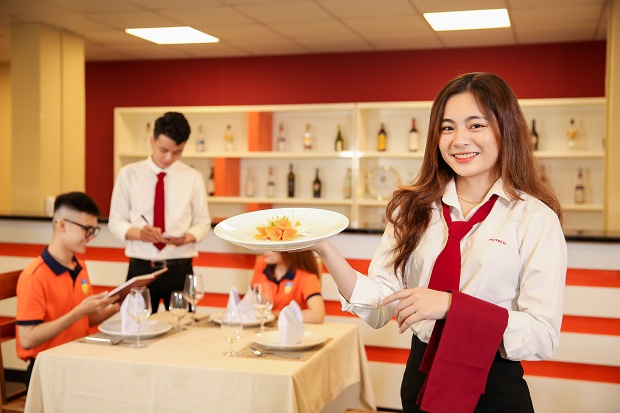 |
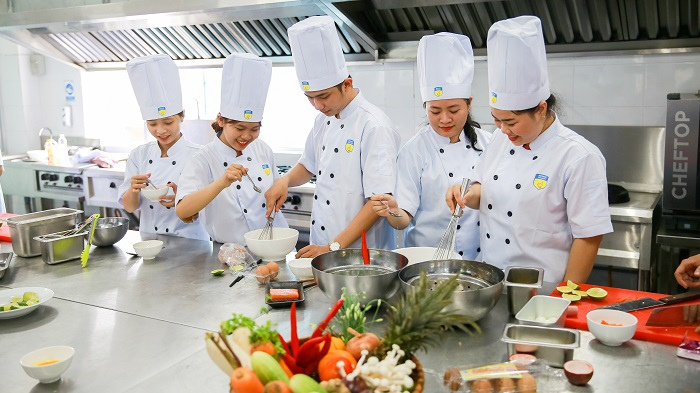 |
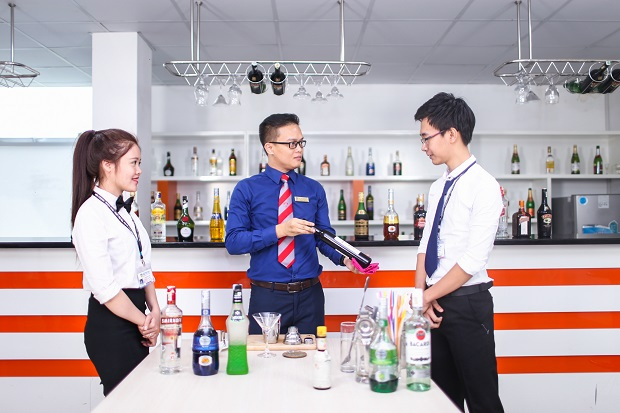 |
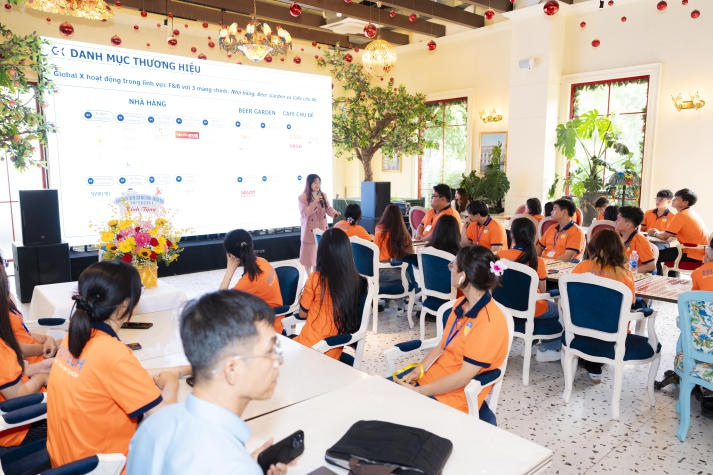 |
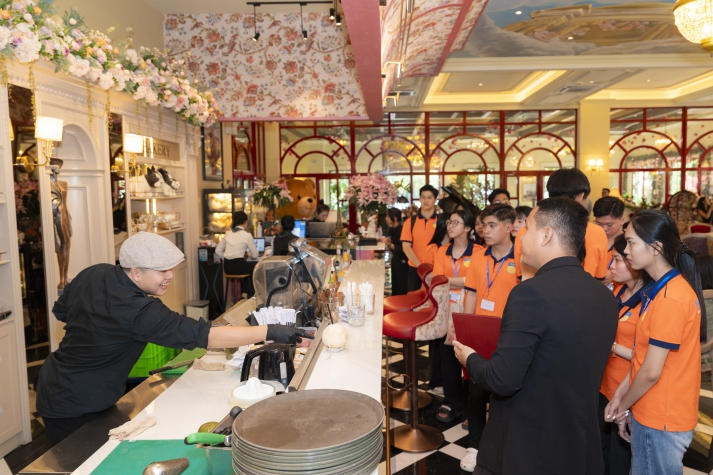 |
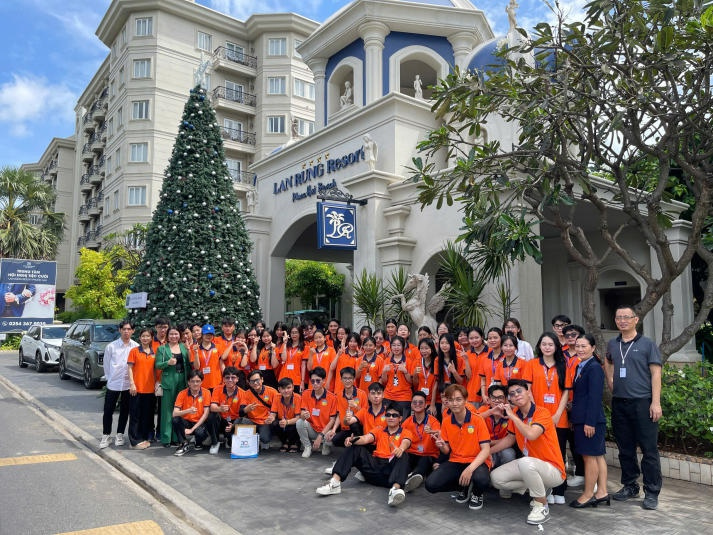 |
|
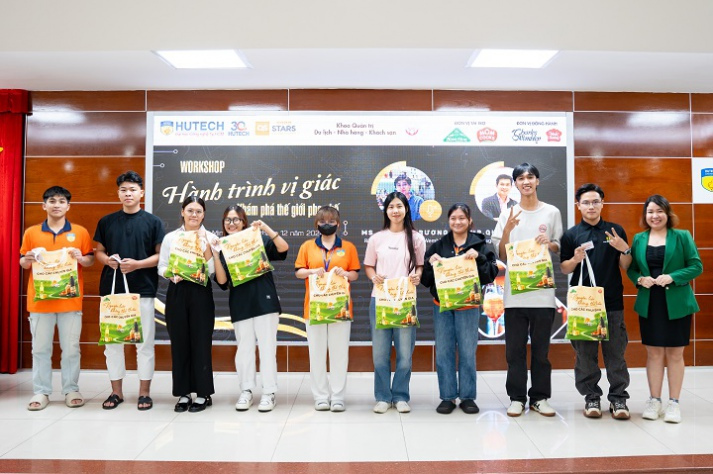
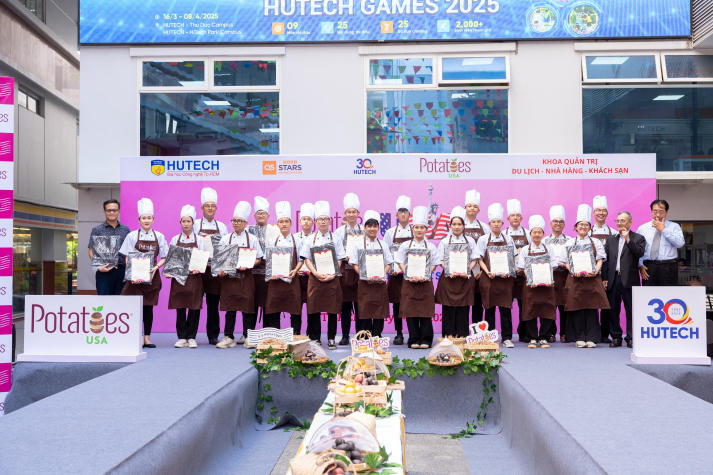
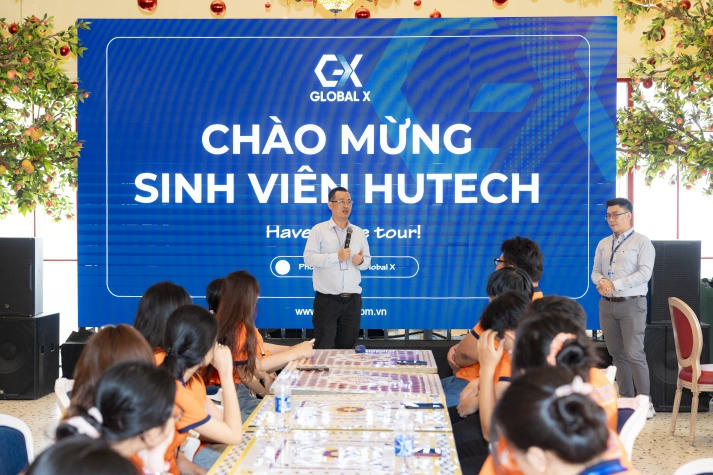

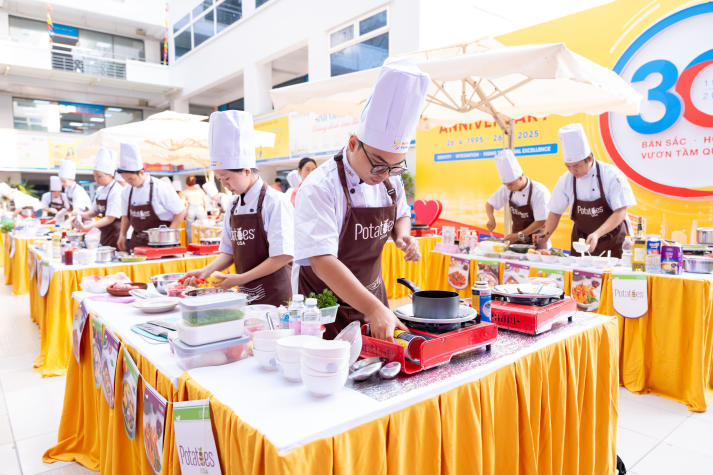
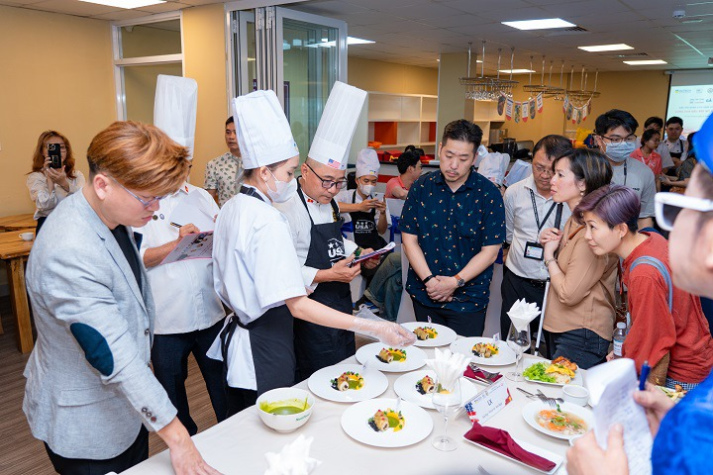
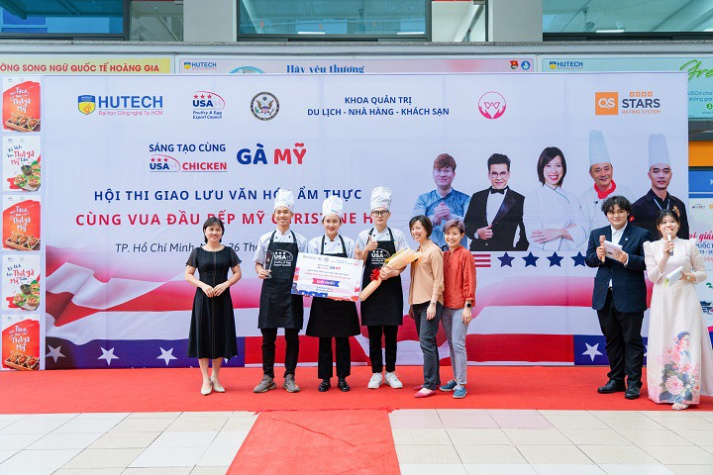
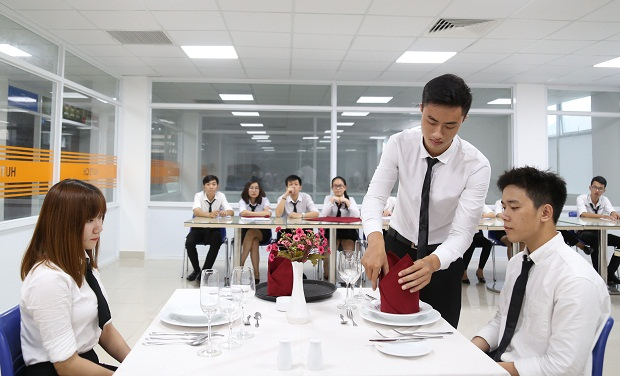
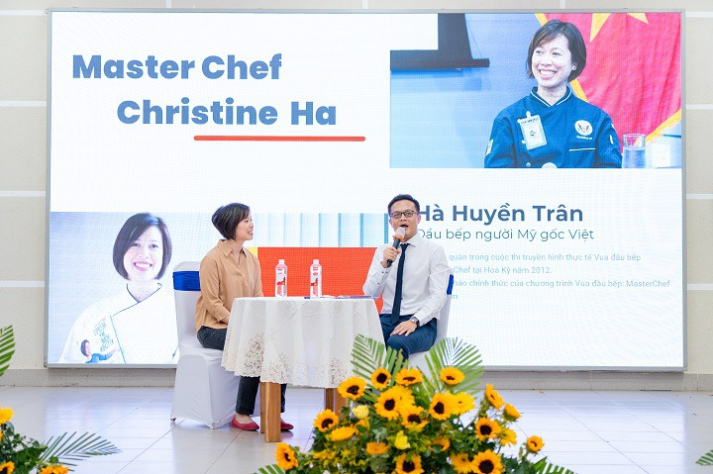
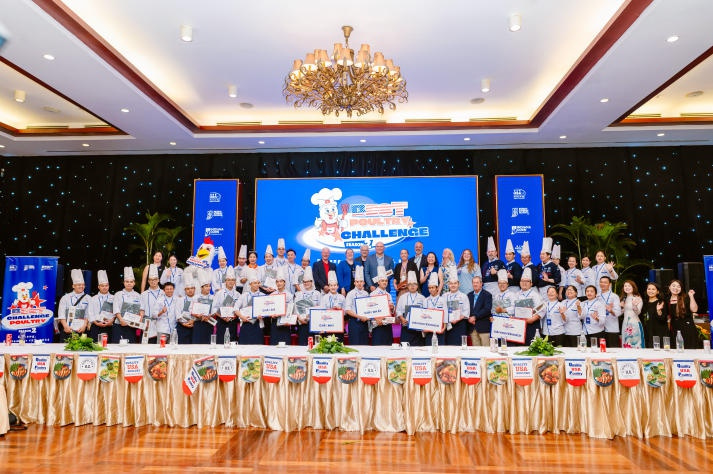
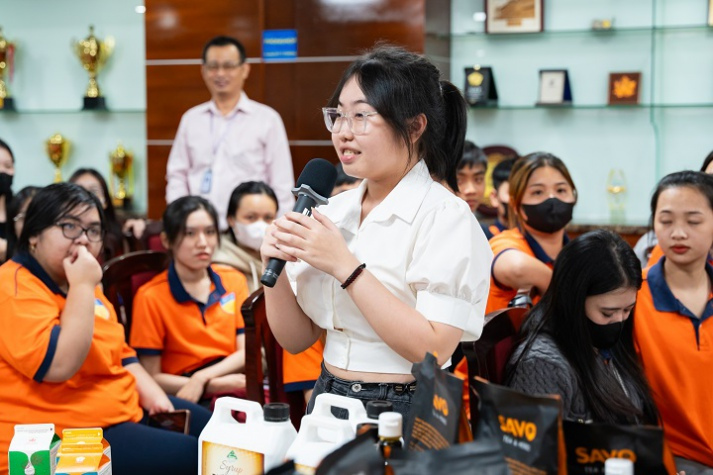
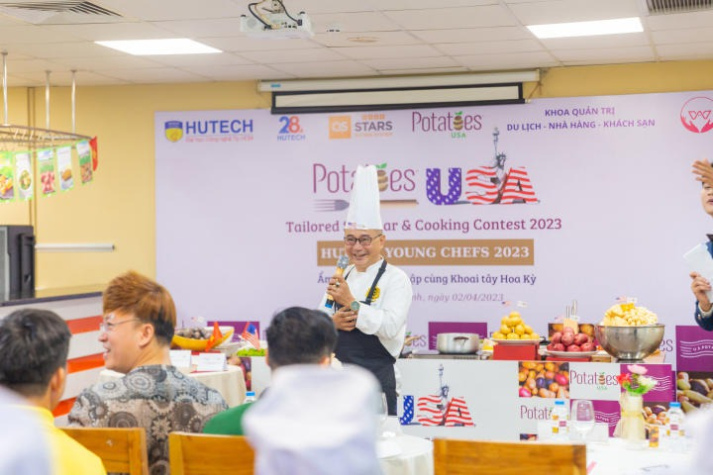
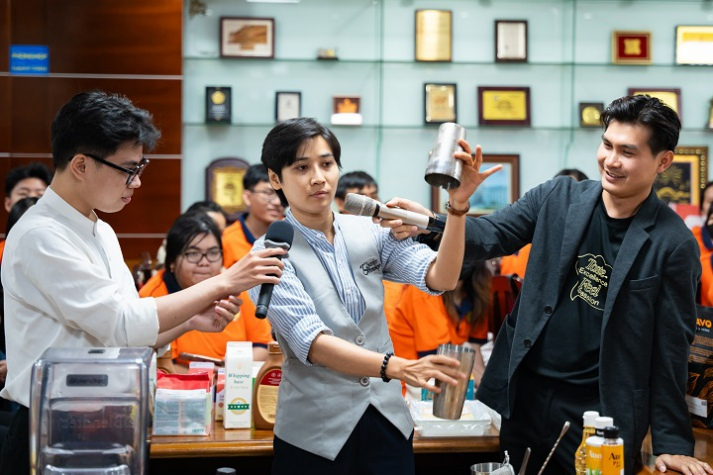
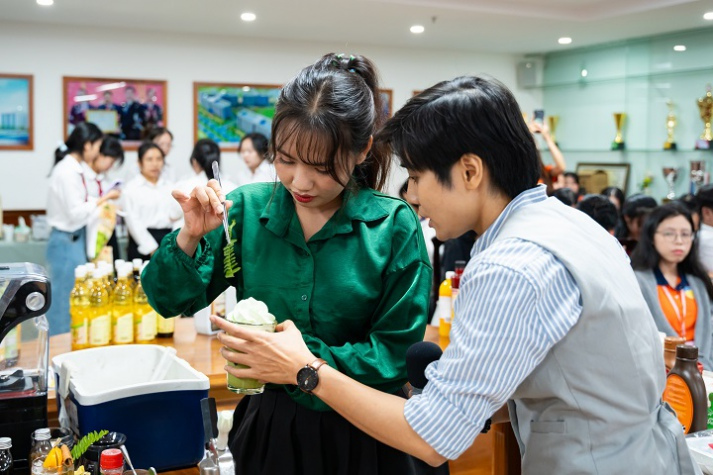
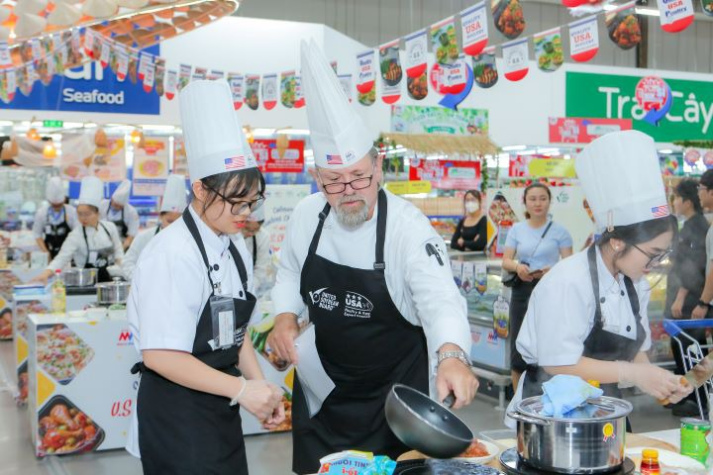
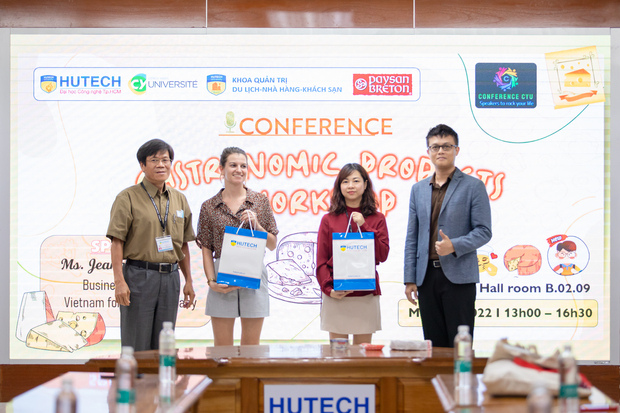
2.4. Program Description
| Name of the Program | Bachelor of Restaurant and Catering Management |
| Programme Duration | The program is completed over 3.5 years in a full-time, divided into 11 academic semesters. |
| Total earned Credits | 137 credits |
| Curriculum Structure | Click here for more information |
2.6. Program Learning Outcomes
| Program Learning Outcome (PLO) | Corresponding to the target (PO) | Competency level (*) | |
|---|---|---|---|
| PLO1 | Apply foundational knowledge in natural and social sciences, political theory, legal studies, and core hospitality principles to restaurant and food service business operations in ways that contribute meaningfully to the sustainable development of society and the community. | PO1, PO3 | 3,0 |
| PLO2 | Flexibly apply specialized knowledge and professional skills in the restaurant and food service sector to create optimal value for businesses and stakeholders, aligned with industry development trends. | PO1, PO2, PO3 | 4,0 |
| PLO3 | Competently perform core service operations in restaurant, food service, and kitchen environments. | PO1, PO2, PO3 | 5,0 |
| PLO4 | Effectively implement managerial approaches and systems in restaurants, kitchens, and food service operations. | PO1, PO2, PO3 | 5,0 |
| PLO5 | Integrate technology, foreign language proficiency, and creative soft skills to communicate effectively using appropriate tools and platforms. Demonstrate problem-solving ability and professionalism in managing restaurant and food service businesses. | PO2, PO3 | 4,0 |
| PLO6 | Develop strong teamwork capabilities, assuming both leadership and collaborative roles to achieve shared goals efficiently. | PO3 | 4,0 |
| PLO7 | Demonstrate a strong sense of responsibility toward both the community and professional duties. | PO3 | 4,0 |
| PLO8 | Pursue clearly defined career goals with a commitment to lifelong learning and the development of managerial thinking. | PO1, PO3 | 4,0 |
2.7. List of Courses
| Semester | 1st Year | 2nd Year | 3rd Year | 4th Year |
|---|---|---|---|---|
| 1 | 1. ENC101 - English 1 2. CAP211 - Introduction to Information Technology 3. TOU107 - Tourism Introduction 4. NDF108 - National Defense and Security 1 5. NDF109 - National Defense and Security 2 6. NDF210 - National Defense and Security 3 7. NDF211 - National Defense and Security 4 |
1. ENC103 - English 3 2.PSY167 - Applied Psychology 3. MAN116 - Management 4. HMM332 - Restaurant Service Arts 5. HMM333 - Beverage Mixing Arts 6. MAR129 - Tourism Marketing 7. HMM342 - Showmanship Arts 8. PSY138 - Psychology and Communication Skills in Tourism Electives Knowledge: - Group 1: PHT305 - Volleyball 2 - Group 2: PHT308 - Basketball 2 - Group 3: PHT311 - Bodybuilding & Aesthetics 2 - Group 4: PHT314 - Vovinam 2 - Group 5: PHT317 - Football 2 |
1. HMM339 - Barista Arts 2. POS104 - Marxist-Leninist Philosophy 3. MAT106 - Linear Algebra and Calculus 4. HMM141 - Conference and Banquet Management 5. SKL116 - Innovation and Startup Thinking 6. TOU134 - Tourism Research Methods 7. FOT138 - Food Hygiene and Safety |
1. HMM435 - Business Project Of Restaurants And Food Services 2. MAN1068 - Kitchen Management Electives Knowledge: Group 1: Travel Management - TOU103 - Tour Guiding - TOU105 - Tour Design and Operation - TOU135 - Customs and Immigration Procedures - MAN120 - Travel Management Group 2: Accommodation Management - MAN117 - Housekeeping Management - HMM104 - Reception Service - MAN1065 - Resort Management - MAN1067 - Hotel Business Management Group 3: Graduation Thesis - HMM426 - Graduation Thesis in Restaurant and Food & Beverage Management |
| 2 | 1. ENC102 - English 2 2. FOT351 - Vegetable, Fruit Carving Arts 3. FOT356 - Baking Practice 4. HMM102 - Table Service 5. HMM103 - Bar Service 6. HMM738 - Restaurant Internship 7. LAW106 - General Law Electives Knowledge: - Group 1: PHT304 - Volleyball 1 - Group 2: PHT307 - Basketball 1 - Group 3: PHT310 - Bodybuilding & Aesthetics 1 - Group 4: PHT313 - Vovinam 1 - Group 5: PHT316 - Football 1 |
1. ENC104 - English 4 2. POS103 - Ho Chi Minh's Ideology 3.ECO108 – Macroeconomics 4. LAW171 - Tourism Law 5. FOT361 - Asian Culinary Arts 6. SKL115 - Project Design Thinking 7. BUS123 - E-commerce in Tourism 8. FOT362 - European Culinary Arts Electives Knowledge: - Group 1: PHT306 - Volleyball 3 - Group 2: PHT309 - Basketball 3 - Group 3: PHT312 - Bodybuilding & Aesthetics 3 - Group 4: PHT315 - Vovinam 3 - Group 5: PHT318 - Football 3 |
1. MAN110 - Culinary Management 2. POS107 - History of the Communist Party of Vietnam 3. MAN158 - Strategic Tourism Management 4. MAN177 - Tourism Financial Management 5. POS105 - Marxist-Leninist Political Economy 6. SOS115 - Southeast Asian Cultures |
1. HMM524 - Graduation Internship in Restaurant and Food & Beverage Management |
| 3 | 1. ECO107 - Microeconomics 2. SOS101 - Fundamentals of Vietnamese Culture |
1. ECO110 - Principles of Economic Statistics 2.TOU116 - Sustainable Tourism Development 3. MAN159 - Human Resource Management in Tourism |
1. POS106 - Scientific Socialism 2. MAN124 - Restaurant Management |
2.8. Teaching & Learning strategies and methods
At HUTECH, our teaching and learning methods are based on international best practice to ensure that students enter the workplace with the knowledge skills they need to succeed in both national and international working environments.
We are committed to providing student an industry-led and student-centered teaching and learning approach.
2.8.1. Teaching and Learning Strategies
Students’ experience includes classroom learning, facilitated online and self-directed learning through Learning Management System (LMS), peer learning, industry field trips and guest speakers. All of these factors ensure that students enter the workplace with the knowledge and skills they need to succeed.
2.9. Student Assessment
At HUTECH, a variety of assessment methods are used to be constructively aligned to achieving the programme learning outcomes and course learning outcomes as well as the teaching and learning objectives: essays, assignments, examination, projects, portfolio, presentation, write thesis, etc.
The assessments methods are used to include rubrics, marking schemes, timelines, and regulations, and these are shown to ensure validity, reliability, and fairness in assessment.
The assessment standards and procedures for student progression and degree completion and assessment-appeal policies are communicated to students, and applied consistently.
2.10. Academic regulation
Academic regulation: Click here for more information
2.11. Career Opportunity
Graduates from the Bachelor’s program in Restaurant and Food & Beverage Service Management, equipped with strong foreign language skills, have excellent opportunities to pursue the following career paths:
3. BACHELOR OF HOTEL MANAGEMENT
3.1. Program Goals
To educate Bachelor of Hotel Management students with strong political awareness, ethical integrity, solid professional knowledge, and proficient practical skills. Graduates will meet standardized competencies in foreign languages and information technology, possess high professional ethics, and gain practical experience through internships at leading hospitality businesses. These foundations prepare them to work independently and collaborate effectively in international hospitality environments.
3.2. Program Objectives
PO1. Possess a solid foundation in general scientific knowledge and in-depth expertise in Hotel Management, enabling graduates to become highly competent professionals capable of performing a wide range of business operations in the hospitality industry.
PO2. Demonstrate essential hotel management skills such as customer service, sales techniques, effective communication in foreign languages, information technology applications in lodging operations, and critical thinking abilities. These competencies allow graduates to carry out and manage operational tasks in hotels and other types of accommodation establishments.
PO3. Exhibit a strong sense of responsibility, professional ethics, political awareness, and commitment to maintaining personal well-being in alignment with the principles of sustainable development and global integration.
3.3. Study Environment
The Bachelor of Hotel Management programme at HUTECH offers students a professional and experiential learning environment aligned with international hospitality industry standards. The programme integrates academic knowledge, industry engagement, and practical training to ensure students are well-equipped for the dynamic hotel and service sectors.
3.3.1. Modern Training Facilitie
Students have access to state-of-the-art practical rooms that simulate real-world hospitality settings, including:
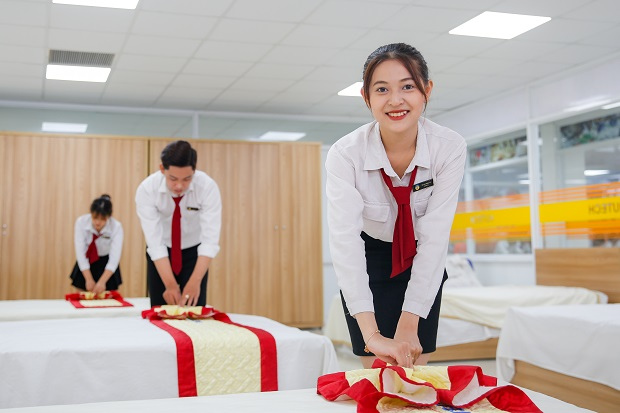 |
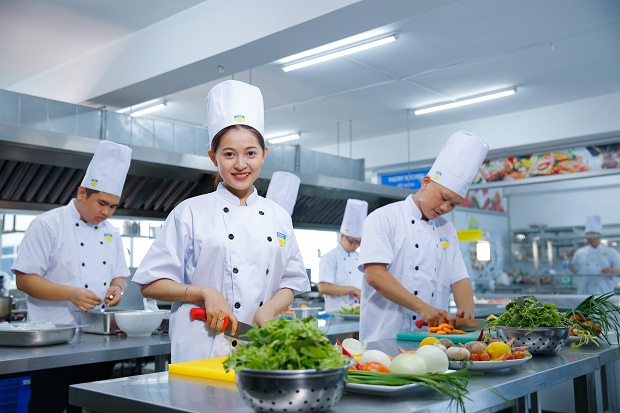 |
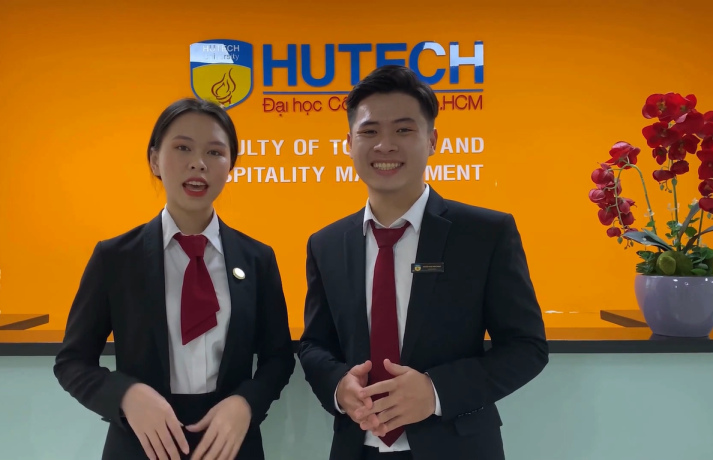 |
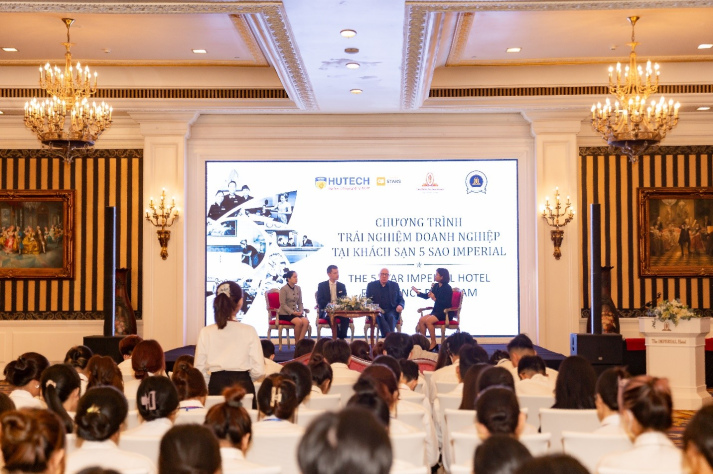
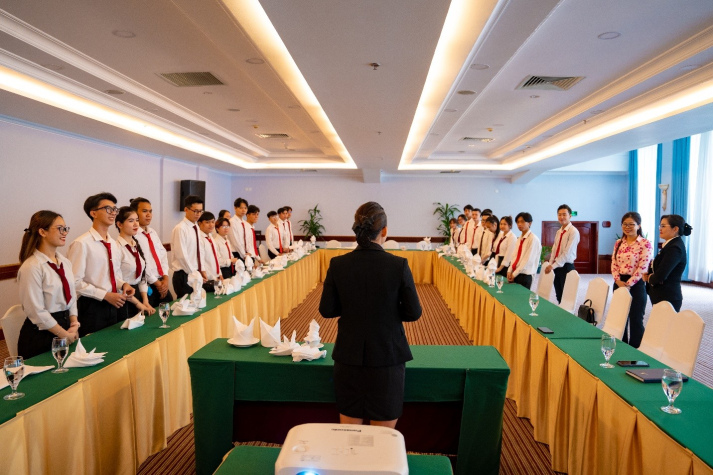
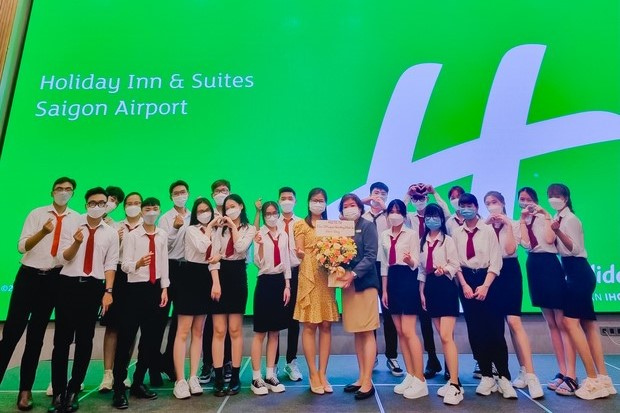
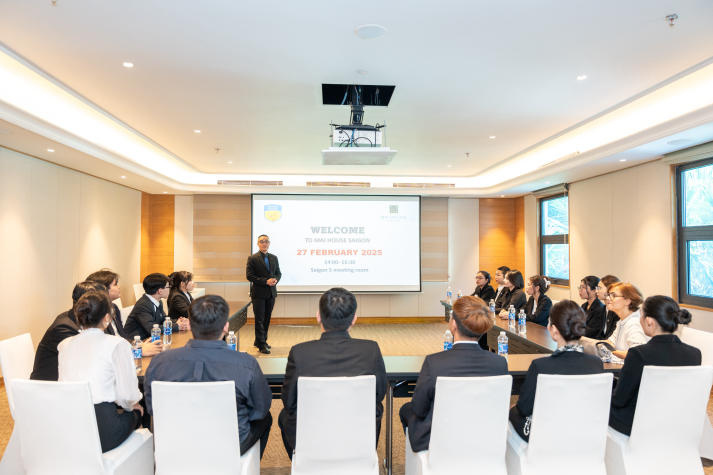
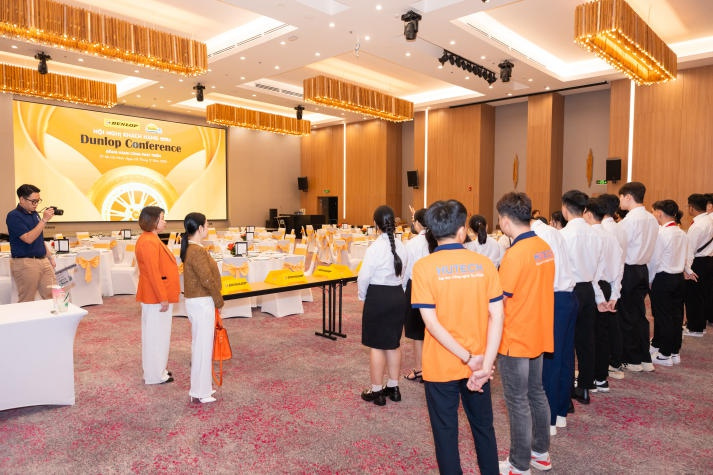
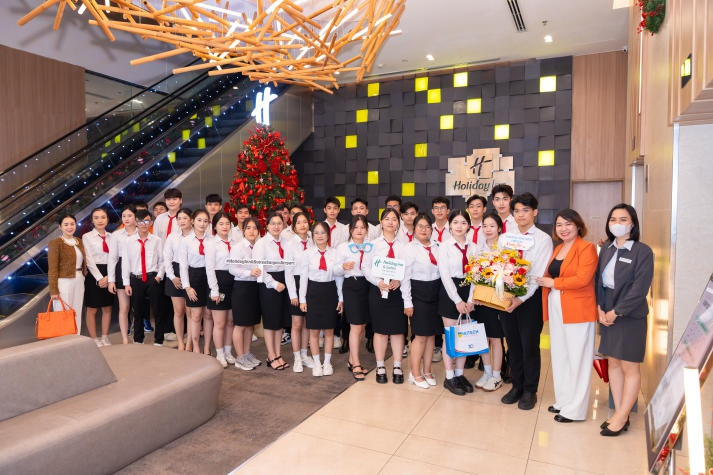
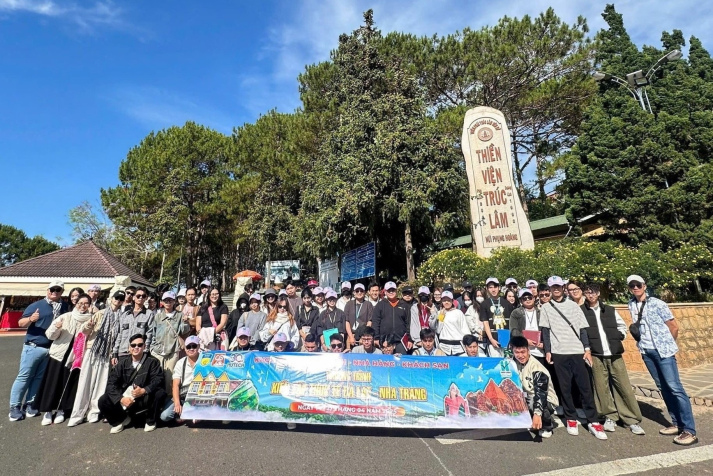
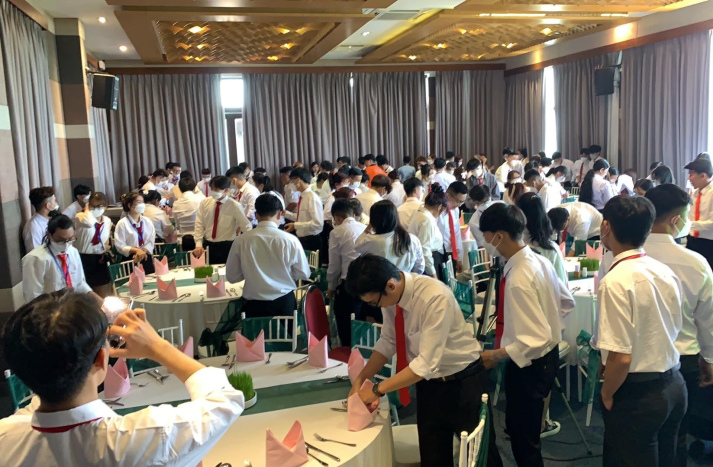
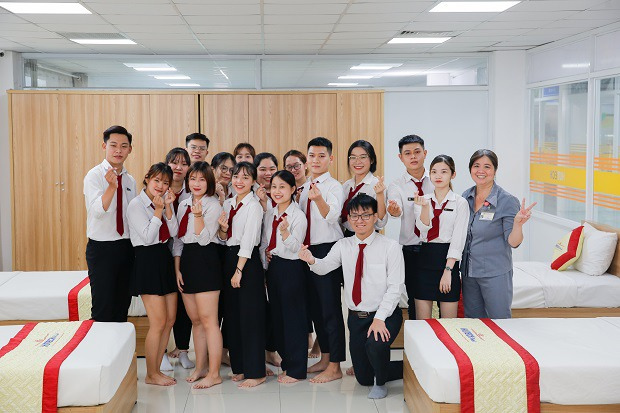
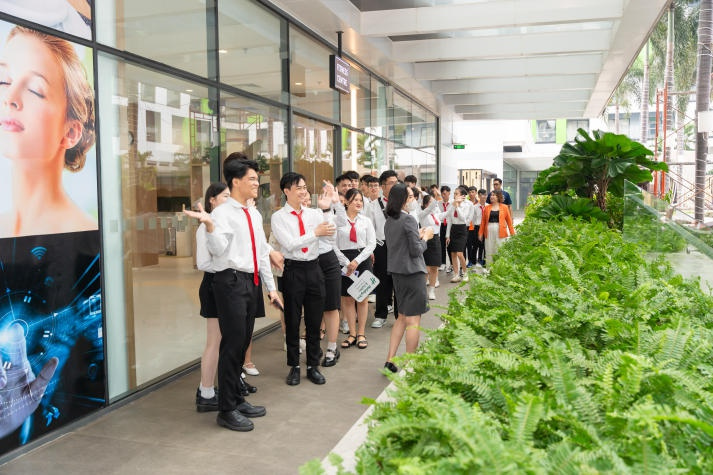
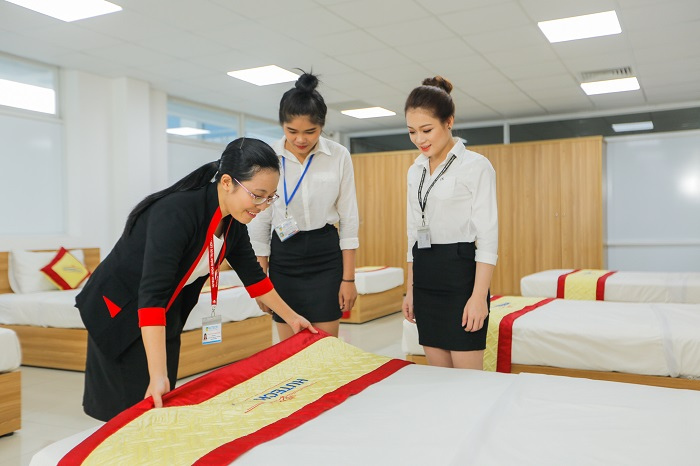
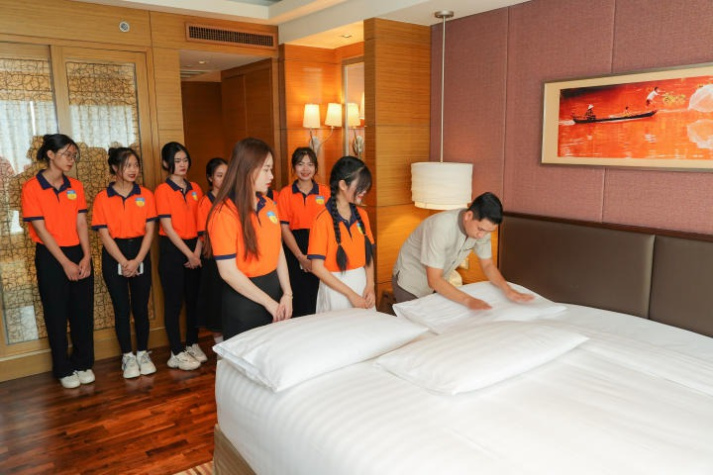
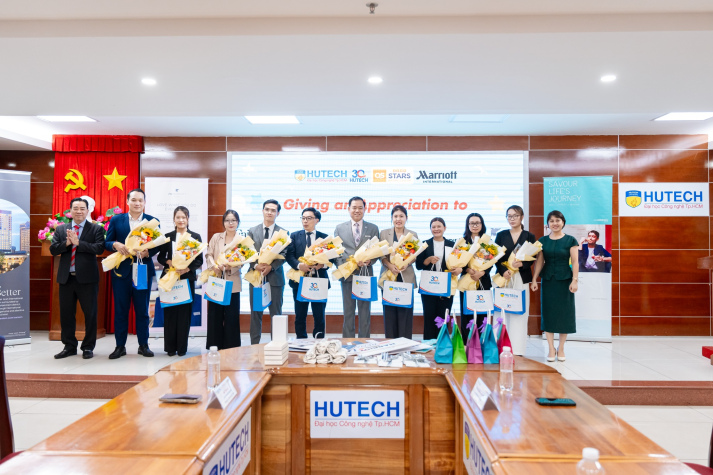
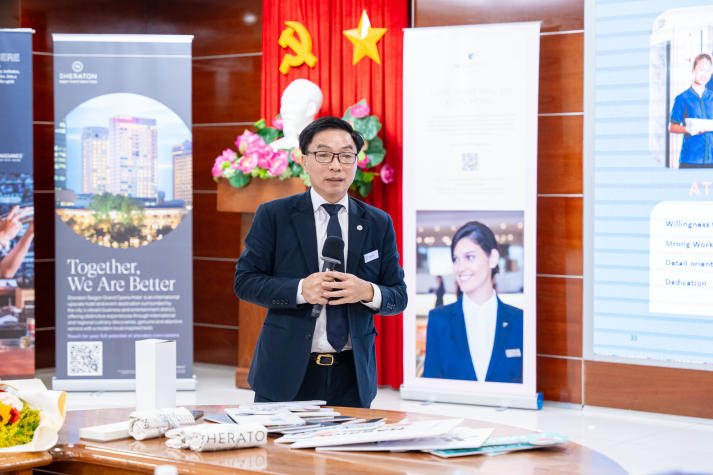

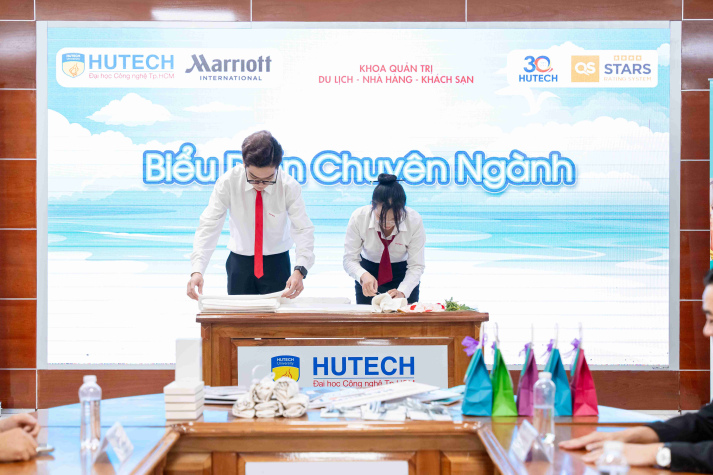
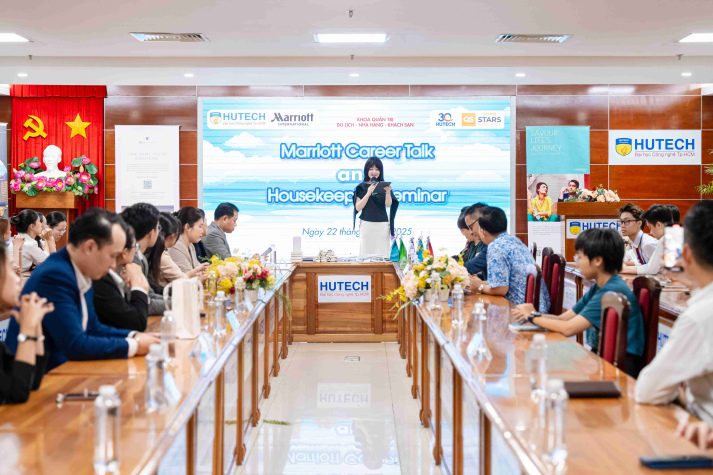
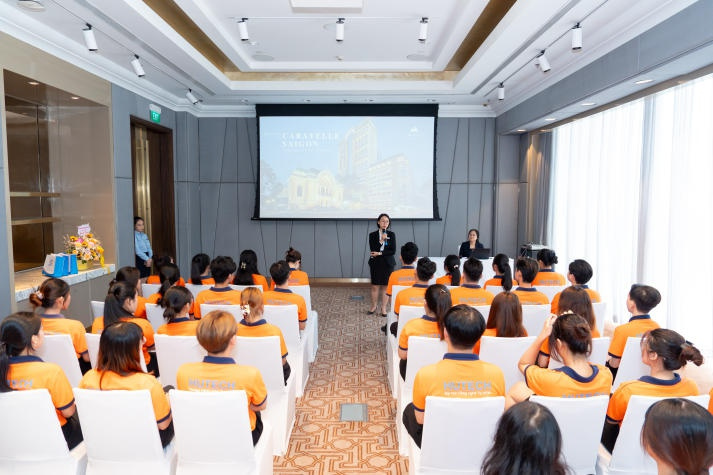
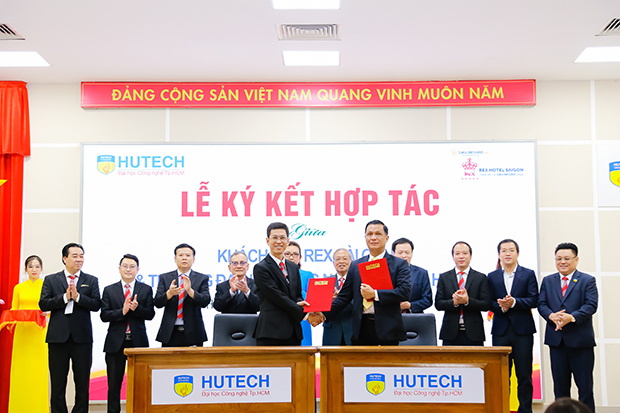
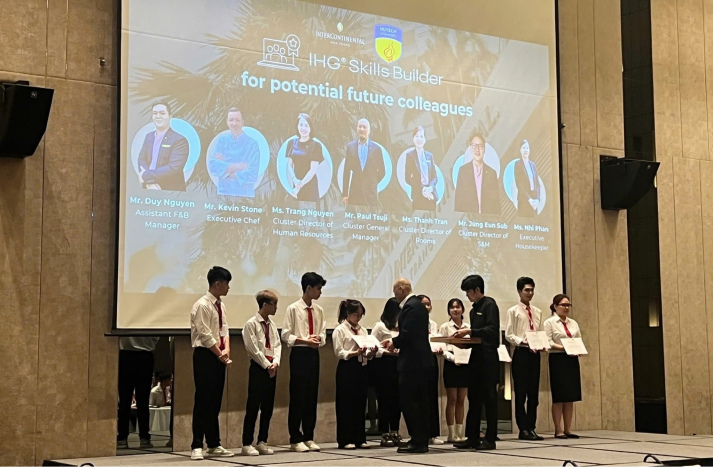
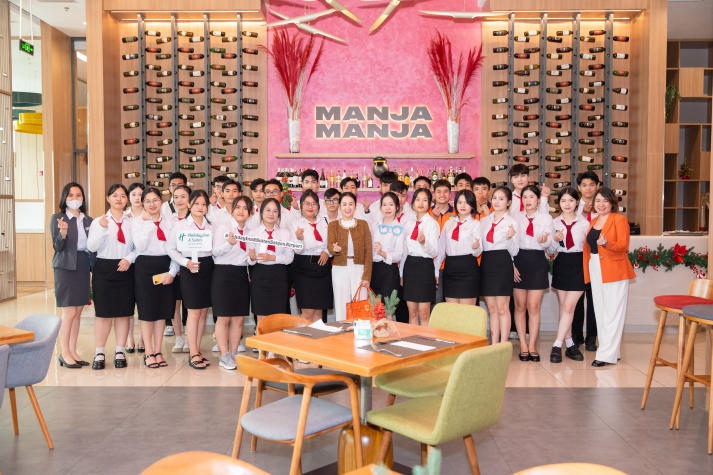
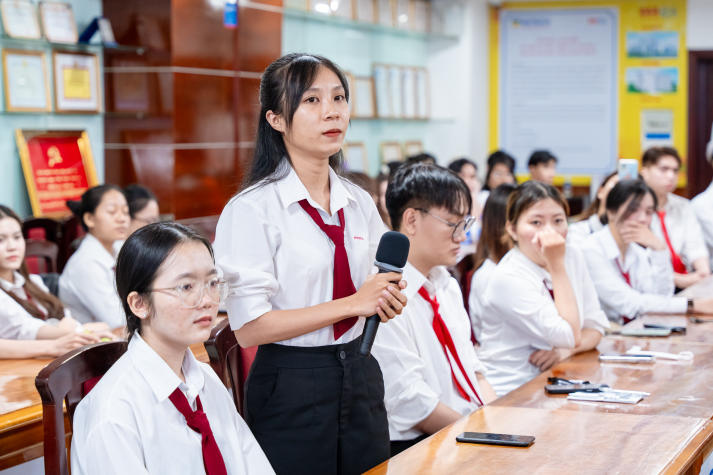
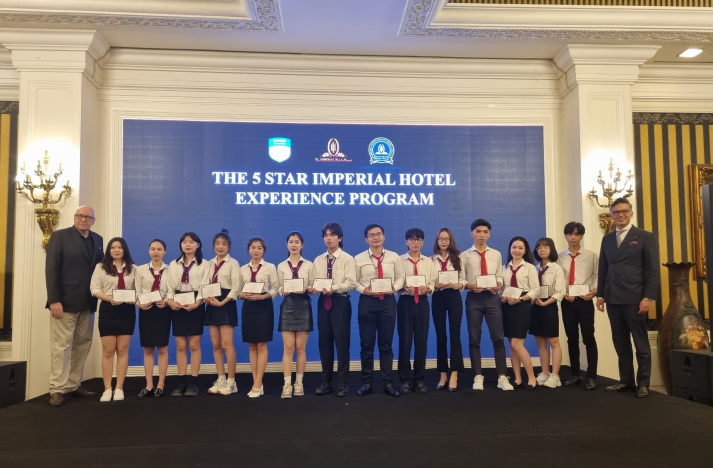
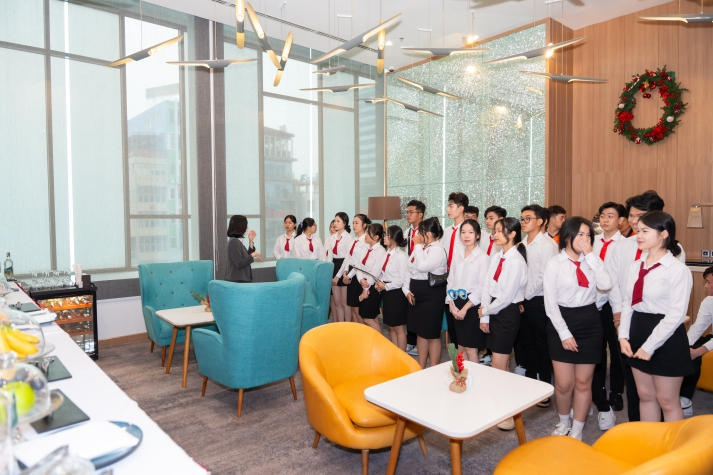
The holistic learning environment fosters essential skills such as teamwork, communication, service mindset, and intercultural competence—preparing students to thrive in both local and international hospitality careers.
3.4. Program Description
| Name of the Program | Bachelor of Hotel Management |
| Programme Duration | The program is completed over 3.5 years in a full-time, divided into 11 academic semesters. |
| Total earned Credits | 137 credits |
| Curriculum Structure | Click here for more information |
3.6. Program Learning Outcomes
| Program Learning Outcome (PLO) | Corresponding to the target (PO) | Competency level (*) | |
|---|---|---|---|
| PLO1 | Apply knowledge of natural and social sciences, politics, law, and foundational hospitality concepts to lodging business operations, contributing effectively to the sustainable development of society and the community. | PO1, PO2 | 3 |
| PLO2 | Adapt general knowledge of lodging operations, organizational structures, and basic hospitality marketing practices to deliver optimal value to enterprises and stakeholders in alignment with current industry trends. | PO1, PO2 | 4 |
| PLO3 | Perform lodging business and hotel service management tasks proficiently and in accordance with industry standards. | PO1, PO2 | 5 |
| PLO4 | Apply managerial methods and business strategies effectively in the operation of hotel and lodging services. | PO1, PO2 | 5 |
| PLO5 | Utilize information technology, foreign languages, creative thinking, and soft skills to communicate effectively—verbally, in writing, and through multimedia—and to solve problems efficiently in hotel business and management operations. | PO2 | 4 |
| PLO6 | Develop teamwork skills in both leadership and member roles to accomplish tasks and achieve organizational goals effectively. | PO2 | 4 |
| PLO7 | Demonstrate responsibility toward the community and the assigned professional tasks. | PO3 | 4 |
| PLO8 | Demonstrate clear career orientation and a commitment to lifelong learning. | PO3 | 4 |
3.7. List of Courses
| Semester | 1st Year | 2nd Year | 3rd Year | 4th Year |
|---|---|---|---|---|
| 1 | 1. ENC101 – English 1 2. MAN116 – Principles of Management 3. TOU107 - Tourism Introduction 4. NDF108 - National Defense Education 1 5. NDF109 - National Defense Education 2 6. NDF210 - National Defense Education 3 7. NDF211 - National Defense Education 4 |
1. ENC103 - English 3 2. LAW106 – Introduction to Laws 3. SOS115 - Southeast Asian Culture 4. MAN1067 - Hospitality Business Management 5. HMM104 - Front Desk Operation 6. MAN124 - Restaurant Management Elective Knowledge: - Group 1: PHT305 - Volleyball 2 - Group 2: PHT308 - Basketball 2 - Group 3: PHT311 - Aesthetic Body Training 2 - Group 4: PHT314 - Vovinam 2 - Group 5: PHT317 - Football 2 |
1. TOU134 - Research and graduate study methodology in Tourism 2. SOS101 - Foundations of Vietnamese Culture 3. MAN1065 – Resort Management 4. ECO110 - Fundamentals of Economic Statistics 5. LAW171 - Tourism Law 6. TOU121 - M.I.C.E Tourism Management |
1. POS107 - History of Vietnamese communist party. 2. MAN159 - Human Resource Management in Tourism Elective Knowledge: Group 1: Travel and Event Services - TOU102 – Customer Service - MAN113 - Service Quality Management - MAN120 - Tour Operations Management - TOU106 – Event Management Group 2: Tour Guiding and Restaurant Operations - TOU108 - Tourist Routes and Destinations - TOU103 - Tour Guiding - FOT139 - Food Commodities - FOT138 - Food Hygiene and Safety Group 3: Graduation Thesis - HMM425 - Graduation Thesis in Hotel Management |
| 2 |
1. ENC102 - English 2 2. PSY167 - Applied Psychology 3. HMM332 - Restaurant Service Skills 4. MAT106 - Linear Algebra and Calculus 5. CAP211 - Introduction to Information Technology 6. HMM737 – Hotel Field Trip Elective Knowledge: - Group 1: PHT304 - Volleyball 1 - Group 2: PHT307 - Basketball 1 - Nhóm 3: PHT310 - Fitness and Aesthetic Training 1 - Group 4: PHT313 - Vovinam 1 - Group 5: PHT316 - Football 1 |
1. ENC104 - English 4 2. MAR129 - Tourism Marketing 3. SKL115 - Project Design Thinking 4. MAN131 - Front Office Management 5. MAN117 - Housekeeping Management 6. ECO108 - Macroeconomics 7. HMM333 – Art of Beverage Mixology Elective Knowledge: - Group 1: PHT306 - Volleyball 3 - Group 2: PHT309 – Basketball 3 - Group 3: PHT312 - Fitness and Aesthetic Training 3 - Group 4: PHT315 - Vovinam 3 - Group 5: PHT318 – Football 3 |
1. POS104 - Philosophy of Marxism and Leninism 2. MAN158 - Tourism and Hospitality Strategic Management 3. MAN1064 - Leadership and Management Skills in Tourism 4. BUS123 - E-commerce in Tourism 5. POS105 - Political economics of Marxism and Leninism 6. POS103 - Ho Chi Minh 's thought 7. MAN124 - Restaurant management |
1. HMM523 - Hotel Management Internship |
| 3 | 1.ECO107- Microeconomics 2. PSY138 - Tourism Communication Skills and Psychology |
1. MAN1066 - Management of Ancillary Services in Tourism Business 2. ACC114 - Principles of Accounting 3. SKL116 - Innovation and Entrepreneurial Thinking |
1. POS106 - Scientific socialism 2. MAN177 - Financial Management in Tourism 3. HMM334 - Room Attendant Practice 4. HMM336 – Front Desk Practice |
3.8. Teaching & Learning strategies and methods
At HUTECH, our teaching and learning methods are based on international best practice to ensure that students enter the workplace with the knowledge skills they need to succeed in both national and international working environments.
We are committed to providing student an industry-led and student-centered teaching and learning approach.
3.8.1. Teaching and Learning Strategies
Students’ experience includes classroom learning, facilitated online and self-directed learning through Learning Management System (LMS), peer learning, industry field trips and guest speakers. All of these factors ensure that students enter the workplace with the knowledge and skills they need to succeed.
3.9. Student Assessment
At HUTECH, a variety of assessment methods are used to be constructively aligned to achieving the programme learning outcomes and course learning outcomes as well as the teaching and learning objectives: essays, assignments, examination, projects, portfolio, presentation, write thesis, etc.
The assessments methods are used to include rubrics, marking schemes, timelines, and regulations, and these are shown to ensure validity, reliability, and fairness in assessment.
The assessment standards and procedures for student progression and degree completion and assessment-appeal policies are communicated to students, and applied consistently.
3.10. Academic regulation
Academic regulation: Click here for more information
3.11. Career Opportunity
As a dynamic field within the service industry group, Hotel Management offers a wide range of attractive career opportunities for graduates. Potential positions include:
4. BACHELOR OF EVENT MANAGEMENT
4.1. Program Goals
Training bachelor's degree holders in Event Management to possess political awareness, strong ethics, solid professional knowledge, proficient vocational skills, and standardized competencies in foreign languages and information technology. They are expected to embody professional ethics and gain practical experience through internships at enterprises, thereby developing the professional capabilities necessary to work independently and collaborate effectively in both domestic and international environments.
4.2. Program Objectives
4.3. Study Environment
The Event Management programme at HUTECH offers students a dynamic, creative, and practice-oriented learning environment. The curriculum is application-driven, combining academic knowledge with real-world event planning experience to ensure students are well-prepared for the competitive job market.
4.3.1. Practice-Oriented Learning Spaces
Students gain hands-on experience in facilities designed to simulate real event operations, including:
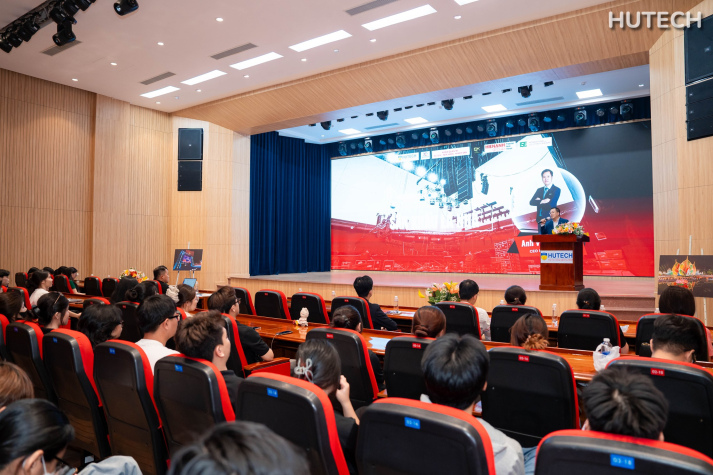 |
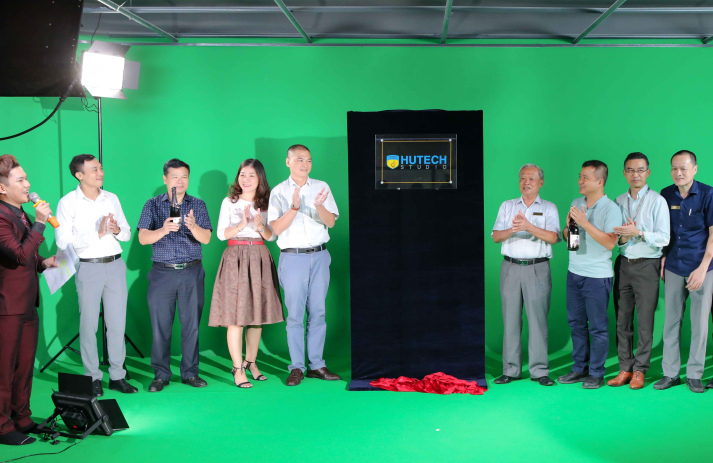 |
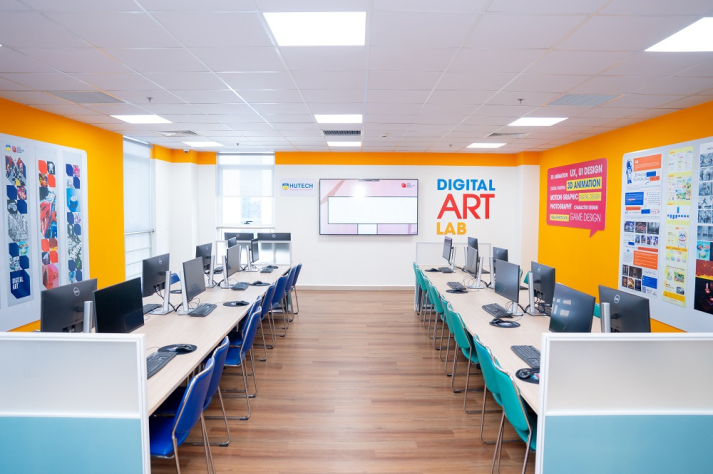 |
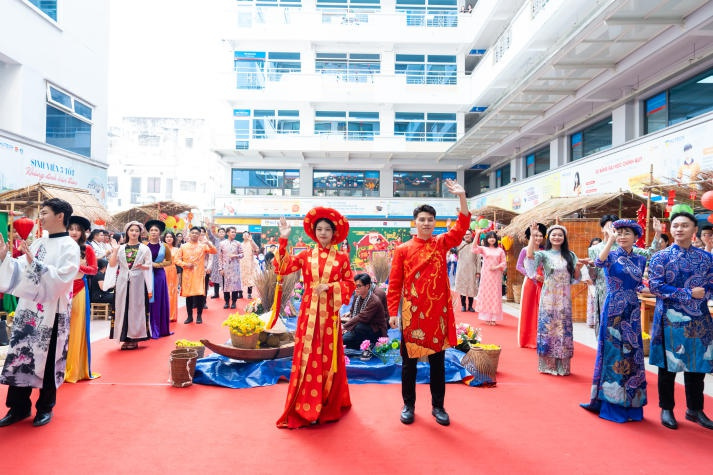 |
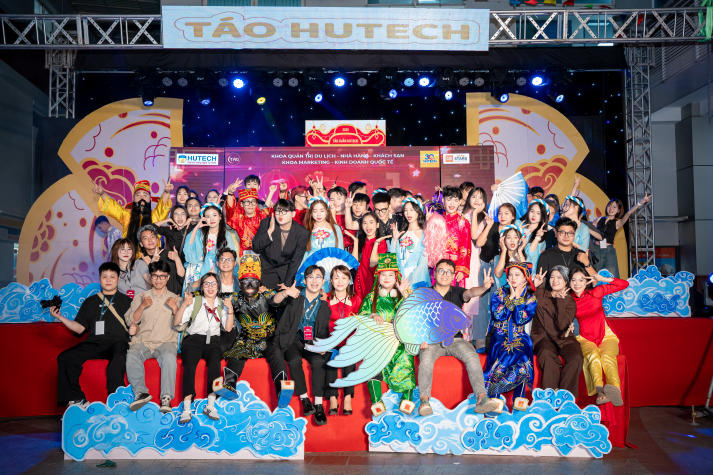 |
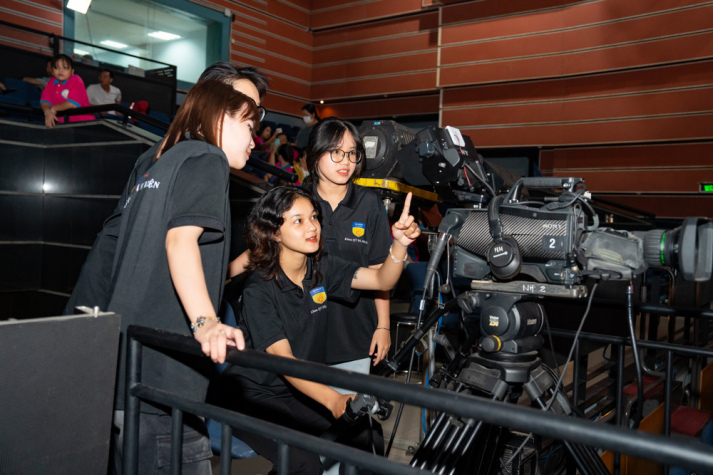 |
These spaces allow students to organize, coordinate, and evaluate events ranging from small-scale workshops to large-scale conferences and festivals.
4.4. Program Description
| Name of the Program | Bachelor of Event Management |
| Programme Duration | The program is completed over 3.5 years in a full-time, divided into 11 academic semesters. |
| Total earned Credits | 137 credits |
| Curriculum Structure | Click here for more information |
4.6. Program Learning Outcomes
| Program Learning Outcome (PLO) | Corresponding to the target (PO) | Competency level (*) | |
|---|---|---|---|
| PLO1 | Able to apply knowledge of natural and social sciences, politics, law, and foundational industry knowledge to business activities in the field of event management, effectively contributing to the sustainable development of society and the community. | PO1, PO2, PO3 | 3,0 |
| PLO2 | Flexibly apply professional knowledge and expertise in the field of event management to deliver optimal value to businesses and stakeholders, in alignment with the overall development trends of the industry. | PO1, PO2, PO3 | 4,0 |
| PLO3 | Proficiently perform advanced professional tasks in management and operations during the business activities of event organization services. | PO2, PO3 | 5,0 |
| PLO4 | Effectively apply various methods of business operations and service management in event organization. | PO2, PO3 | 5,0 |
| PLO5 | Able to apply information technology skills, foreign language proficiency, creative thinking, and soft skills to communicate effectively - verbally, in writing, and through multimedia - with stakeholders, and to solve problems efficiently during the operation of event organization business activities. | PO2, PO3 | 5,0 |
| PLO6 | Develop teamwork skills in both leadership and team member roles to carry out tasks effectively. | PO2, PO3 | 4,0 |
| PLO7 | Demonstrate a sense of personal responsibility toward work and the community. | PO2, PO3 | 4,0 |
| PLO8 | Demonstrate clear career goals and a commitment to lifelong learning. | PO2, PO3 | 4,0 |
4.7. List of Courses
| Semester | 1st Year | 2nd Year | 3rd Year | 4th Year |
|---|---|---|---|---|
| 1 | 1. ENC101 - English Level 1 2. MAN1051 - An introduction events and entertaiment 3. ECO107 -Microeconomics 4. NDF108 - Defense and Security Education 1 5. NDF109 -Defense and Security Education 2 6. NDF210 - Defense and Security Education 3 7. NDF211 - Defense and Security Education 4 |
1. ENC103 - English Level 3 2. PSY167 - Applied Psychology 3. EVT103 - Event Planning Skills 1 4. TOU341 - Tour Livener Skills 5. SOS115 - : Southeast Asian Culture 5. PSY168 - Communication skills and psychology in Event 6. MAN1073 - Event Sales Management Electives Knowledge: - Group 1: PHT305 - Volleyball Course 2 - Group 2: PHT308 - Basketball Course 2 - Group 3: PHT311 - Fitness and Aesthetics 2 - Group 4: PHT314 - Vovinam 2 - Group 5: PHT317 - Football 2 |
1. EVT112 - Event directing and staging 2. POS105 - Marxist-Leninist Political Economy 3. EVT108 - Fundraising activities 4. MAT101 - Linear Algebra and Calculus 5. EVT109 - Application of Technology in Events 6. MAN1075 - Risk Management in Event |
1. POS107 - History of the Communist Party of Vietnam Electives Knowledge: Group 1: MICE & Sports Tourism Events - MAN1080 - Event Management in Tourism- EVT114 - Sport Event management - TOU121 - Sport Event management - MAN1081 - Venue and Facilities Management in Sports Events Group 2: Entertainment – Culture – Arts – Theatre - MAN1082 - Sport event ––Entertaiment- Tourism Management - EVT115 - Event program editor - MDC148 - Technical production for performing arts - MDC149 - Film - Advertising Production Group 3: Graduation Course in Event - EVT416 -Graduation Course in Event Management |
| 2 | 1. ENC102 - English Level 2 2. ECO107 - Macroeconomics 3. SOS101 - Foundations of Vietnamese Culture 4. LAW189 - Legal Regulations on Event Organization 5. MAN1077 - Customer management in Event Organization 6. EVT701 - Applied Technology in event 1 Electives Knowledge: Group 1: PHT304 – Volleyball 1 Group 2: PHT307 – Basketball 1 Group 3: PHT310 – Fitness & Aesthetics 1 Group 4: PHT313 – Vovinam 1 Group 5: PHT316 – Football 1 |
1. ENC104 - English Level 4 2. POS103 - Ho Chi Minh Thought 3. EVT104 - Event Planning Skills 2 4. ECO110 – Principles of Economic Statistics 5. CAP211 – Introduction to Information Technology 6. EVT702 - Applied Technology in event 2 7. EVT106 - Event Document Preparation Electives Knowledge: Group 1: PHT306 – Volleyball 3 Group 2: PHT309 – Basketball 3 Group 3: PHT312 – Fitness & Aesthetics 3 Group 4: PHT315 – Vovinam 3 Group 5: PHT318 – Football 3 |
EVT111 - Methods for Writing Event Proposals 2. POS104 - Marxist-Leninist Philosophy 3. MAN1076 - Event and Festival Logistics Management 4. EVT110 - Event production organization 5. SKL116 - Innovation, Creativity, and Entrepreneurial Thinking 6. MAN1079 - Events Project Management |
1. EVT513 - Graduation Internship in Event Management |
| 3 | 1. MAN116 - Principles of Management 2. MAR149 - Marketing communications for events |
EVT207 - The Art of Persuasion and Public Speaking 2. SKL115 - Project Design Thinking 3. MAN1074 - Event Human Resource Management |
1. MAN1078 - Event Strategic Management 2.POS106 – Scientific Socialism 3. LAW106 – Introduction to Law |
4.8. Teaching & Learning strategies and methods
At HUTECH, our teaching and learning methods are based on international best practice to ensure that students enter the workplace with the knowledge skills they need to succeed in both national and international working environments.
We are committed to providing student an industry-led and student-centered teaching and learning approach.
4.8.1. Teaching and Learning Strategies
Students’ experience includes classroom learning, facilitated online and self-directed learning through Learning Management System (LMS), peer learning, industry field trips and guest speakers. All of these factors ensure that students enter the workplace with the knowledge and skills they need to succeed.
4.9. Student Assessment
At HUTECH, a variety of assessment methods are used to be constructively aligned to achieving the programme learning outcomes and course learning outcomes as well as the teaching and learning objectives: essays, assignments, examination, projects, portfolio, presentation, write thesis, etc.
The assessments methods are used to include rubrics, marking schemes, timelines, and regulations, and these are shown to ensure validity, reliability, and fairness in assessment.
The assessment standards and procedures for student progression and degree completion and assessment-appeal policies are communicated to students, and applied consistently.
4.10. Academic regulation
Academic regulation: Click here for more information
4.11. Career Opportunity
As a field that has recently gained significant interest among young people, Event Management offers a wide range of diverse career opportunities. Graduates can pursue roles such as:
III. MASTER
1. MASTER OF TOURISM AND TRAVEL MANAGEMENT
1.1. Program Goals
The Master's programme in Tourism and Travel Management is designed to: Equip learners with in-depth theoretical and practical knowledge in the field of tourism and travel services; Enable them to analyse and evaluate the effectiveness of tourism organisations in the context of domestic and international socio-economic developments; Develop and propose effective and innovative management solutions for the planning, organisation, and operation of tourism and travel activities; Independently address emerging professional and practical issues; Contribute to the development of a high-quality workforce that meets the demands of innovation and sustainable development in the tourism industry during the process of international integration.
1.2. Program Objectives
PO1. Systematically evaluate advanced theories and foundational knowledge in the field of tourism and travel management; synthesise industry development trends to build critical thinking and a knowledge base for developing new insights; integrate specialised knowledge with related areas such as economics, society, environment, and management to explain and clarify practical issues.
PO2. Combine and creatively apply managerial, leadership, communication, and organisational skills in the interdisciplinary working environment of the tourism and travel sector; effectively design and coordinate service activities in travel enterprises, hotels, restaurants, recreational areas, etc. Collaborate and lead cross-functional teams to enhance work performance and tourism service quality.
PO3. Flexibly apply in-depth knowledge to identify, analyse, and evaluate complex issues in tourism and travel; propose and implement appropriate solutions in managing tourism enterprises, meeting the demands of innovation and responding to socioeconomic changes; develop strategic thinking in organising travel activities and enhance decision-making capabilities.
PO4. Evaluate and adjust professional behaviour based on ethics, social responsibility, and international professional standards; proactively adapt to multicultural and highly competitive work environments; pursue self-directed development, build lifelong learning plans, and be ready for international integration in the tourism and service industry. Graduates of the Master of Tourism and Travel Management programme are equipped with a well-rounded portfolio of knowledge, competencies, and professional values essential for career advancement in the global tourism industry.
They possess in-depth theoretical and practical expertise in tourism and travel services, strategic planning, sustainable tourism, destination marketing, and cross-cultural management. Graduates are adept at identifying, analyzing, and addressing complex challenges in tourism operations, while creatively designing and managing tourism programmes, events, and service systems that align with market trends and customer needs. They are also proficient in research methodologies and quantitative analysis, enabling evidence-based decision-making in a dynamic socio-economic environment. Furthermore, graduates exhibit strong leadership, ethical standards, social responsibility, and the ability to work in interdisciplinary and multicultural teams. Their commitment to lifelong learning and adaptability to global trends ensures their capacity to contribute to the sustainable development and competitiveness of the tourism sector, both nationally and internationally.
1.3. Study Environment
The MTTM programme at HUTECH offers a modern, application-oriented, and internationally integrated learning environment that fosters learners’ comprehensive development in both academic knowledge and professional competencies.
1.3.1. Modern Facilities
Learners attend classes in well-equipped rooms featuring projectors, audio systems, and air conditioning. Specialized practical spaces such as hotel simulation rooms, restaurant practice centers, kitchens, and bartender training areas enhance real-world experience and hands-on learning.
1.3.2. Digital Learning Platforms
The programme is supported by a digital ecosystem, including HUTECH’s Learning Management System (LMS), the e-HUTECH portal, and the Edusoft training management system—allowing students to manage their schedules, access materials, and track academic performance anytime, anywhere.
1.3.3. Academic and Research
Resources HUTECH provides a modern library system with thousands of printed books and digital resources, including access to national and international databases, supporting learners in both coursework and academic research.
1.3.4. Industry-Based and Practical Learning
The curriculum integrates research activities, thematic discussions, academic seminars, and field trips to leading businesses in tourism, travel, and hospitality. These activities help learners apply knowledge in real-world settings while expanding their professional networks.
1.3.4. Active Academic Environment
Beyond the classroom, learners are encouraged to join academic clubs, expert talks, industry workshops, and scientific conferences organized by the Faculty and the Institute. These activities promote creativity, critical thinking, and collaboration in a dynamic educational space.
1.4. Program Description
| Name of the Program | Master of Tourism and Travel Management |
| Programme Duration | To be completed in 2 years on a full-time basis over 4 semesters |
| Total earned Credits | 61 credits |
| Curriculum Structure | Click here for more information |
| Program Learning Outcome (PLO) |
Corresponding
to the target (PO)
|
Competency level (*) | |
|---|---|---|---|
| PLO1 | Systematically evaluate theories and models in the field of Tourism and Hospitality Management to explain and compare current industry trends in the context of globalization | PO1 | 5,0 |
| PLO2 | Synthesize and link specialized knowledge with areas of economics, society, management, and the environment to clarify practical issues in tourism and hospitality management. | PO1 | 5,0 |
| PLO3 | Design and creatively coordinate programs, activities, and events in the tourism and hospitality industry, in alignment with market characteristics, customer groups, and organizational resources. | PO2 | 5,0 |
| PLO4 | Apply comprehensive leadership, management, and communication skills in an interdisciplinary work environment to enhance performance and the quality of tourism services in businesses. | PO2 | 4,0 |
| PLO5 | Collaborate and effectively manage multifunctional teams to address emerging issues and improve operational efficiency in the tourism and hospitality sector. | PO2 | 5,0 |
| PLO6 | Flexibly apply in-depth knowledge to identify and analyze complex issues in tourism operations, and propose feasible strategic solutions. | PO3 | 4,0 |
| PLO7 | Evaluate and improve tourism service policies, plans, and organizational models to optimize management effectiveness and enhance the competitiveness of businesses. Evaluate professional behavior and adjust according to ethical standards and social responsibility, in alignment with professional requirements and a multicultural work environment. | PO3, PO4 | 5,0 |
| PLO8 | Independently create personal development plans and proactively update new knowledge to adapt to changes and international integration in the tourism sector. | PO4 | 3,0 |
1.7. List of Courses
|
Semester |
1st Year |
2nd Year |
|---|---|---|
| 1 |
1. GPHI101: Philosophy (4 Crs)
2. GECO103: Economic Tourism (3 Crs)
Elective courses: - GTOU113: Exploiting Cultural Heritage in Tourism Development (3 Crs) - GMAN132: Business Statistics (3 Crs) - GFIN104: Finance and Tourism Analysis (3 Crs) - GTOU131: Risk management in Tourrism (3 Crs) |
1. GMAN104: Public Administration in Tourism (3 Crs)
2. GTOU112: Research Methodology in Hospitality and Tourism Industry (3 Crs)
3. GMAR101: Tourism Destination Marketing (3 Crs)
4. GMAN119: Human Resource Management in Hospitality and Tourism Industry (3 Crs) 5. GTOU110: M.I.C.E Tourism Management (3 Crs) Elective courses: - GMAN113: Administration of Tourism Investment Projects (3 Crs) - GTOU121: E-Tourism (3 Crs) |
| 2 | 1. GMAN114: Sustainable Tourism Managerment (3 Crs) 2. GTOU109: Cross Culture and Consumer Behavior in Hospitality and Tourism Industry (3 Crs) 3. GTOU111: International Hotel Management(3 Crs) 4. GMAN109: Strategic Management in Hospitality and Tourism Industry (3 Crs) Elective courses: - GECO105: Econometrics and Applied models in Tourism (Crs) - GTOU132: Experience tourism (3 Crs) |
1. GTOU101: Research Project in Hospitality and Tourism Industry (3 Crs) 2. GTOU401: Dissertation in Hospitality and Tourism (9 Crs) 3. GTOU403: Practical topic for Hospitality and Tourism Industry (6 Crs) |
1.8. Teaching & Learning strategies and methods
1.8.1. Teaching & Learning Strategies
The programme applies diverse and student-centered strategies aligned with HUTECH’s educational philosophy:
“Learn to learn – Learn to do – Learn to create – Learn to be independent – Learn to develop together” These strategies aim to foster active engagement, independent inquiry, problem-solving skills, and reflective thinking among learners. The main strategies include:
These strategies and methods are integrated throughout the curriculum via key modules such as: Research Methods, Building Tourism Experiences, Strategic Management, E-Tourism, and as well as through capstone projects and research assignments.
They enable students to develop critical thinking, research capability, creativity in tourism product design, teamwork, and an entrepreneurial mindset—consistent with HUTECH’s focus on applied, industry-relevant, and internationally integrated education.
1.9. Student Assessment
The MTTM programme at HUTECH applies a comprehensive, outcome-based assessment system to evaluate learners’ mastery of the programme learning outcomes (PLOs). This system integrates both formative and summative assessments designed to align with Bloom’s Taxonomy and measure a wide range of cognitive and practical competencies.
1.9.1. Assessment Methods Include